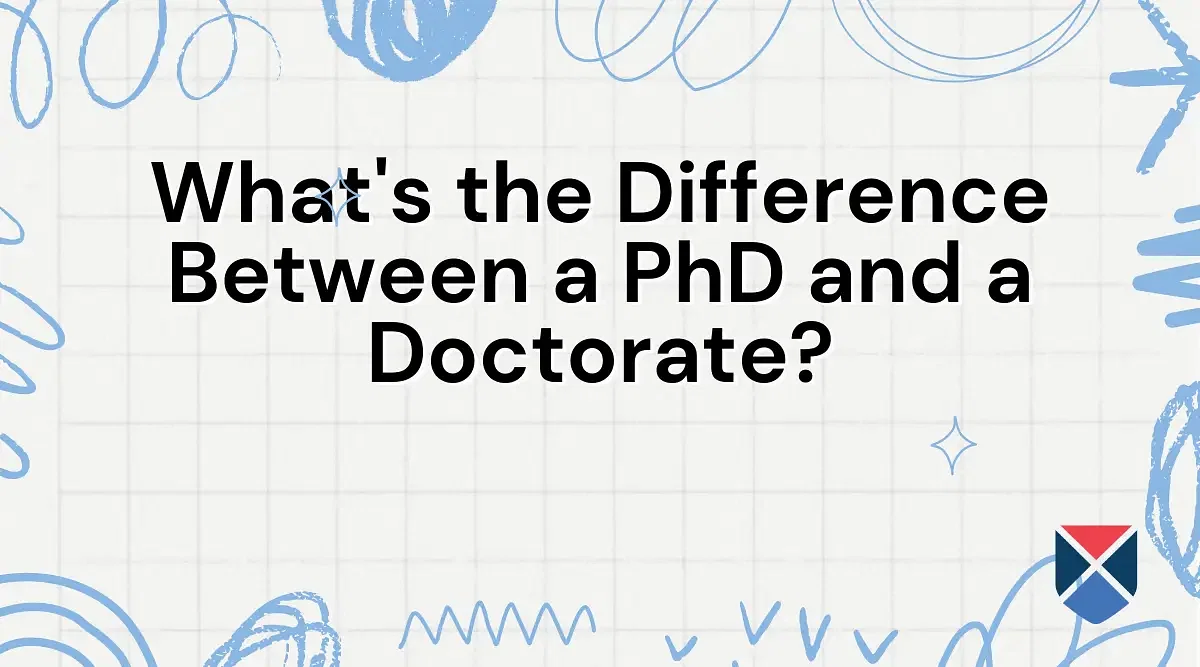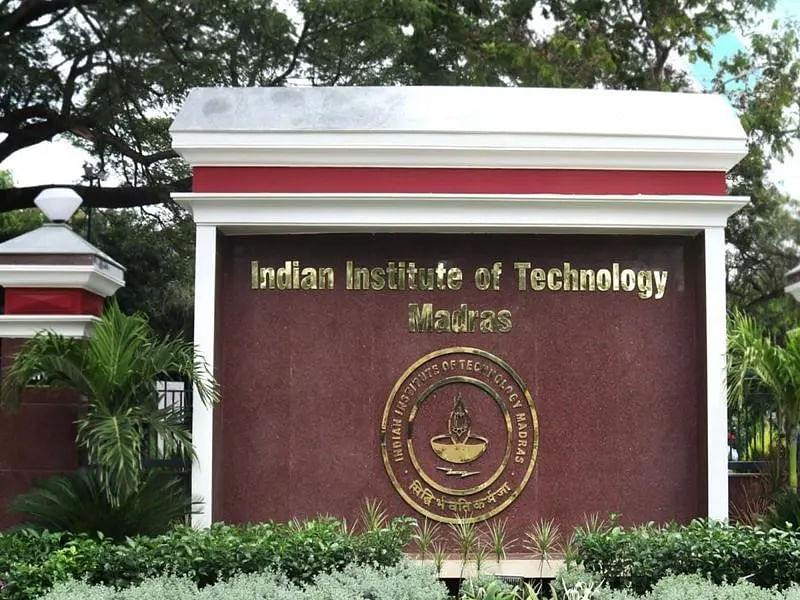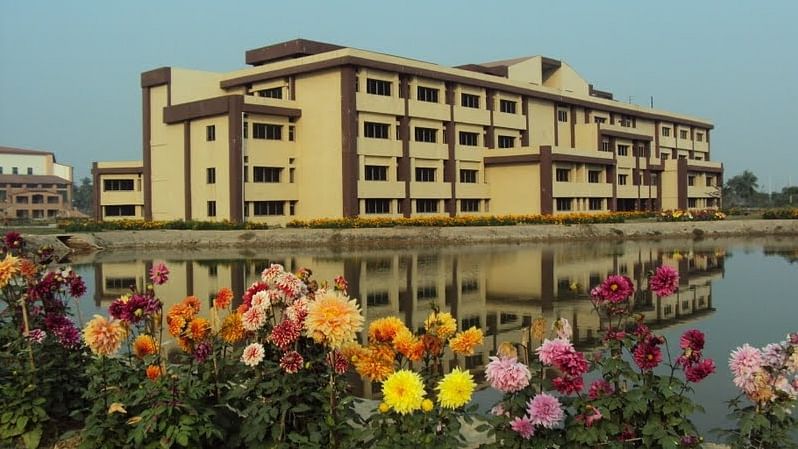
- October 11, 2023
- Education Advice

Ph.D. vs. Doctorate: What are the Differences?
UOTP Marketing

For those who have a deep-seated attitude, pursuing a doctoral degree can be a tough yet beneficial journey. Currently enrolled in a doctorate program means that a person has already scooched over college admissions, went through high stake tests and exams, and finished all those research papers and long hours spent in university libraries hitting the books. While studying for a doctorate entails asserting oneself to an extensive amount of quality time and money , its significance and purpose usually pave the way to a lucrative end.
After having finished the Master’s Degree , students begin to think about their next step in their academic career. Then, paradoxically, while navigating through academia, they find themselves baffled by the immense terms and terminologies used to label specific degrees. Because the terms “Doctorate” and “Ph.D.” are somehow interlocked and overlap, and because “PhD” is sometimes used inconsistently, it can lead to considerable confusion. Ph.D. vs. Doctorate? You might wonder what their difference is, and why they are important. E xplaining what each of these terms stands for, the difference between them, and why they are valuable, can help you steer yourself down the right path from the outset.
Doctorate Degree vs. Ph.D.

At first glance, it is pretty easy to confuse these two terms. But it is important for everyone to be able to make a distinction between the two. In this article, we will discuss the difference between Ph.D. and Doctorate in detail in order to get rid of any confusion you may have. In the academic world, the terms Doctorate and Ph.D. are currently used interchangeably. Both of them are the top cap of the ladder. However, a doctorate is mostly used as an umbrella term covering many fields ranging from professional degrees, humanities, and scientific disciplines.
A Ph.D. or Doctor of Philosophy, on the other hand, is a subcategory of a doctoral degree, it is much more distinct and clear-cut and is usually narrower in nature encompassing only humanities and scientific fields. In plain English, when someone says they are enrolling on a doctoral degree, it means they are doing a Ph.D. in a specific field. So, technically, in common parlance, there is no difference between the two terms.
But at the other end of the spectrum, one should be careful not to confuse a professional doctoral degree with a Ph.D. The former is more practical and is designed to prepare students to apply existing knowledge to find solutions to real-life problems and has a direct application to a particular profession.
A Ph.D. is theoretical by nature and is more academic and research-focused. it is often fixed on disseminating knowledge by conducting authentic research which means reviewing and identifying gaps in current literature and evaluating the relevance of existing and emerging theories within a particular field.
What Is a Ph.D. Degree and Why Should You Go for It?
Students who acquire a Ph.D. are justly proud — they wear it as a badge of identity in the academic elite. Traditionally, a Ph.D. was associated with teaching, which from Latin licentia docendi meant “license to teach”. However, the concept of Ph.D. has been on shifting sands nowadays and has become a more general term that isn’t necessarily confined to teaching only.
The Value of a PhD

Obtaining a Ph.D. helps you capitalize on the emerging academic opportunities making you more easily identifiable to employers or businesses seeking to fill professional, higher-level job positions. Many of these career options, conversely, are not available to those who do not belong to the Ph.D. club. While pursuing a Ph.D. requires devoting a tremendous effort and time and making significant personal sacrifices pushing the boundaries of knowledge, it’s all in service of the area of study you’re most passionate and zealous about. Ultimately, once you’ve attained your Ph.D., you will have achieved the pinnacle of education— something not too many people have or are able to accomplish.
FREE RESOURCE

A Guide to Choosing and Applying to Ph.D. Programs
Learn everything you need to know about selecting and applying to Ph.D. programs. Learn tips and tricks for a successful application and find your ideal program today!
What Is a Doctorate Degree?
A doctoral or doctorate degree is usually the most advanced degree one can earn in an academic discipline. Many pursue a doctorate degree to increase their professional credibility, be acknowledged as an expert in a specific field, and improve their resume.
A doctorate degree is a graduate-level credential that is usually earned after multiple years of graduate school. Earning a doctoral degree requires a significant level of research and work. In order to get this degree, one has to research a subject thoroughly, conduct new research and analysis, and provide a solution or interpretation into the field. But what types of doctoral degrees are available?
Types of Doctorate Degrees
There are two categories of doctorate degrees: an academic degree and a professional doctorate degree. An academic degree focuses on research, data analysis, and the evaluation of theory. A professional doctorate degree, on the other hand, is considered a terminal degree, which means that one has achieved the most advanced degree in the field. This degree is specifically designed for working professionals who want to grow in their careers.
Professional Doctorate Degrees
A professional doctorate is designed for working professionals who have experience in the field and want to increase their knowledge, improve their credibility, and advance their careers. This degree focuses on applying research to practical issues, coming up with interpretation and solutions, as well as designing effective professional practices within a particular field.
Professional doctoral degrees include:
Doctor of Business Administration (DBA)
The DBA degree is ideal for students who already have a general business background and are interested in delving deeper into the practical and theoretical aspects that underpin business education. More to the point, in DBA you will develop the ability to solve real-life problems, discover the relevant expertise to innovate and uphold complex business issues and so much more. Upon completion, DBA students will possess enhanced leadership and strategic skills as well as the tools to propel their careers in today’s marketplace. The Business Administration industry is keen on finding such graduates with business skills and this is indicated by the immense job positions currently available.
Doctor of Education (Ed.D.)
If you are interested in setting your eyes on creating lifelong learning among your students, making a positive influence in educational culture, contributing to the growing body of research in the education realm , or just enhancing your subject matter expertise, the Doctor of Education program ticks all the boxes. This degree maintains a rigorous approach in academic education that prepares graduates to showcase the skills and expertise to devise solutions in tackling the challenges in contemporary education practice and become transformational leaders in the industry.
Doctor of Computer Science (DCS)
The demand for computer scientists has reached its peak and it is among the most sought-after positions nowadays. With a degree in DCS, you will have the opportunity to design, apply innovative experiments, predict trends and, ultimately, develop a richer understanding and contribute to your area of expertise. After all, who doesn’t want an exciting and financially stable career?
Interested in pursuing a degree?
Fill out the form and get all admission information you need regarding your chosen program.
This will only take a moment.
Message Received!
Thank you for reaching out to us. we will review your message and get right back to you within 24 hours. if there is an urgent matter and you need to speak to someone immediately you can call at the following phone number:.
By clicking the Send me more information button above, I represent that I am 18+ years of age, that I have read and agreed to the Terms & Conditions and Privacy Policy , and agree to receive email marketing and phone calls from UOTP. I understand that my consent is not required to apply for online degree enrollment. To speak with a representative without providing consent, please call +1 (202) 274-2300
- We value your privacy.
Doctor of Medicine (M.D.)
The Doctor of Medicine degree is designed to prepare you for various medical challenges in different settings nationally and internationally. This program will further develop your critical thinking and clinical reasoning skills required for safe, high-quality medical practices. It will also improve your leadership, communication, and teamwork skills for collaborative patient care.
Doctor of Optometry (O.D.)
This professional degree typically requires four years of study. It focuses on basic biological sciences such as anatomy and physiology, microbiology, neuroanatomy, and so on. This doctoral degree will prepare, educate, and train professionals to practice at the highest level of proficiency, professionalism, and integrity.
Doctor of Psychology (PsyD)
The Doctoral of Psychology degree concentrates on the clinical and applied aspects of psychology. This type of doctorate prepares students for professional practice and clinical placement. This degree will be highly beneficial when working directly with patients who need psychology services. In addition, this degree allows doctors of psychology to confidently function as researchers and clinicians.
How to Choose a Ph.D. Program?
Choosing a Ph.D. program can be pretty challenging; it is a big academic decision and investment that requires commitment and perseverance. But how can you pick the right Ph.D. program for you? Well, there are some tips to help you choose the best fit for your goals and preferences:
- Think about the reasons why you want a Ph.D., what you expect to gain from it, and whether it is compatible with your professional goals.
- Consider your research environment.
- Take your time to research, compare, and consider multiple opportunities carefully.
- Pick a subject that interests and motivates you but is also practical.
- Ask your professors and other scholars in the field for advice.
All in all, the terms “Doctorate’’ and “Ph.D.” are in essence the same, which means all Ph.D. students are Doctoral students as well. On the other hand, earning a Ph.D. degree is no joke. If anything, Ph.D. students have the tenacity, patience, persistence, and years of hard work that you can vouch for. Ultimately, deciding what type of doctoral degree you should hop on, depends on your career goals, what you are passionate about and how you are going to achieve it.
Frequently Asked Questions
What is the difference between a doctorate and a ph.d..
In academic contexts, the terms “Doctorate” and “Ph.D.” are often used interchangeably, but there is a distinction. A Doctorate is an umbrella term covering a wide range of fields, including professional degrees, humanities, and scientific disciplines. A Ph.D., or Doctor of Philosophy, is a specific type of doctoral degree, typically focused on research and academic pursuits in the humanities and scientific fields.
Why should I pursue a Ph.D.?
Pursuing a Ph.D. can be a valuable endeavor, as it opens up academic and research opportunities, enhances your expertise in a specific field, and makes you more attractive to employers seeking candidates for high-level positions. It’s a chance to push the boundaries of knowledge and become an expert in your chosen study area.
What are the benefits of a professional doctorate?
Professional doctorate degrees, such as Doctor of Business Administration (DBA) or Doctor of Education (Ed.D.), are designed for working professionals who want to apply research to practical issues in their field. These degrees can enhance your career prospects, leadership skills, and problem-solving abilities within your profession.
How do I choose the right Ph.D. program?
To choose the right Ph.D. program, consider your career goals, research environment, and personal interests. Take your time to research and compare programs, seek advice from professors and experts in your field, and ensure that the program aligns with your professional aspirations.
What are the main differences between academic and professional doctorate degrees?
Academic doctorate degrees focus on research, theory evaluation, and data analysis, often leading to careers in academia or research. Professional doctorate degrees are more practical, designed for working professionals, and concentrate on applying research to real-world problems within a specific field.
Can I earn a Ph.D. in any field?
Ph.D. programs are available in various fields, including humanities, social sciences, natural sciences, engineering, and more. However, the specific availability of Ph.D. programs may vary by field and university.
Is a Ph.D. a challenging journey?
Yes, pursuing a Ph.D. can be a challenging journey that requires dedication, patience, and years of hard work. It involves conducting original research, writing a dissertation, and often teaching or assisting in courses. It’s a significant commitment, but it can be highly rewarding.
What are the potential career opportunities after earning a Ph.D.?
With a Ph.D., you can pursue careers in academia as a professor or researcher, work in research and development roles in various industries, or take on leadership positions in organizations. The specific career path will depend on your field of study and personal interests.
Share it with your friends!
Explore more.

Accounting vs. Finance Degree: Which Major to Choose?

12 Important Bookkeeping Skills You Need for a Successful Career
Recent resources.

How Long Does It Take to Become a Full-Stack Developer?

14 Essential Web Developer Skills You Need to Master

How to Become a Software Developer?

10 Essential Cybersecurity Skills You Must Have
INTERESTED IN LEARNING MORE?
Chat with an Admissions Officer Now!

- Associates Degree
- Bachelors Degrees
- Masters Degrees
- Doctoral Degrees
- Faculty & Staff
- Accreditation
- Student Experience
QUICK LINKS
- Admission Requirements
- Military Students
- Financial Aid

- ACADEMIC ADVICE
What’s the Difference Between a Ph.D. and a Doctorate?
- July 8, 2024
Table of Contents
Research (academic), applied (professional), what is a ph.d., is a ph.d. higher than a professional doctorate, doctoral study vs. dissertation, who is it for, what do you learn in each, can a ph.d. be called a doctor, the bottom line, what’s the difference between a ph.d. and a doctorate, are ph.d. and doctorate terms interchangeable, what are examples of other doctorate degrees besides a ph.d., do ph.d. and doctorate programs have different structures or requirements, which is more academic-focused: ph.d. or other doctorate degrees, can ph.d. holders and other doctorate degree holders use the title “dr.”.
The terms Ph.D. and Doctorate are often used interchangeably when considering advanced degrees in academia. Both degrees involve rigorous academic study and research, but their focus, duration, and requirements differ. Hence, these significant differences between the two are worth understanding before deciding which path to pursue.
In this article, we will explore the difference between a Ph.D. and a doctorate, including their definitions, the types of programs they are offered in, and the career opportunities they lead to.
What Is a Doctorate?
A doctorate degree is the highest level of academic degree that can be awarded by a university. It typically requires a minimum of three to five years of advanced study and research beyond a bachelor’s or master’s degree .
Doctoral programs are designed to prepare individuals for advanced careers in academia, research, or other professional fields. There are two main types of doctorates: Research (Academic) and Applied (Professional). Let’s talk about each in more detail.
A research doctorate, also known as an academic doctorate, is a type of doctoral degree focused on original research and advancing knowledge in a specific academic field. These programs require students to take advanced coursework in their field and complete original research contributing to the body of knowledge in their study area.
The research component is typically the program’s centerpiece, and students are expected to produce a dissertation or thesis that represents a significant contribution to their field of study. A research doctorate is highly valued in academia, and graduates often pursue careers as professors, researchers, or scholars in their field.
While a significant time commitment and dedication are required, they provide individuals with the skills and knowledge necessary to make contributions to their field and advance their careers in academia. Examples of research doctorates include the Doctor of Philosophy (Ph.D.), Doctor of Science (D.Sc.), and Doctor of Education (Ed.D.) , among others.
An applied doctorate, or professional doctorate, is a type of doctoral degree that focuses on applying knowledge and skills in a specific profession or industry. These programs emphasize the practical application of research and theories to solve real-world problems in their field.
The curriculum includes coursework designed to enhance students’ professional skills, including leadership , management, or organizational behavior. An applied doctorate program’s capstone project or dissertation addresses a real-world problem or issue within the student’s profession or industry. The research is conducted in collaboration with professionals in the field.
While applied doctorate programs require a significant time commitment and dedication to a specific profession, they provide individuals with the knowledge and skills necessary to become experts in their field and make a great impact. Graduates of such programs are well-prepared to take on leadership roles in their profession. The degree can lead to higher salaries and career advancement.
Examples of applied doctorates include the Doctor of Education (Ed.D.), Doctor of Business Administration (DBA), and Doctor of Psychology (Psy.D.), among others.
Students who have completed advanced studies in a particular academic field and contributed original research to that field are awarded a Ph.D., also known as a Doctor of Philosophy. Ph.D. programs are geared toward developing independent scholars who can conduct original research and advance knowledge in their chosen fields.
The coursework of a Ph.D. program involves advanced studies in the student’s area of interest, coupled with a significant research component. Students must produce a dissertation or thesis that adds to the existing body of knowledge in their field of study.
Ph.D. programs generally require multiple years to complete and lead to opportunities for graduates to work as professors, scholars, or researchers within their field of specialization.
While Ph.D. degrees are commonly associated with academic careers, they can also offer advantages for graduates seeking positions in government or industry, as they demonstrate expertise in a specific area and an aptitude for original research.
Comparing a Ph.D. to a professional doctorate is difficult, as both degrees have distinct characteristics and are designed for different purposes.
A Ph.D. is primarily a research-focused degree focused on producing independent scholars who can conduct original research and contribute to the advancement of knowledge in a particular field.
On the other hand, a professional doctorate focuses on the application of knowledge and skills in a specific profession or industry. These programs typically emphasize the practical application of research and theories to solve real-world problems in their field.
Graduates of professional doctorate programs are well-prepared to take on leadership roles in their profession, and the degree can lead to career advancement and higher salaries.
So, in terms of purpose and focus, Ph.D. and professional doctorate degrees are different. It’s not a matter of one being higher than the other, but rather, it depends on an individual’s career goals and aspirations. Both degrees are considered terminal degrees, meaning they represent the highest level of academic achievement in their respective fields.
The Difference Between a Ph.D. and a Doctorate
Understanding the differences between a Ph.D. and a professional doctorate can help you make an informed decision about which program is right for you and your career goals. And while both types of degrees require extensive study and research, there are significant differences between the two.
One of the key differences between a Ph.D. and a professional doctorate is the focus of the doctoral study. Ph.D. programs typically focus on producing independent scholars who can conduct original research and advance knowledge in their chosen field.
In contrast, professional doctorate programs emphasize the practical application of research and theories to solve real-world problems in their field.
While both degrees require extensive research, Ph.D. programs often require a significant original contribution to the field in the form of a dissertation, while professional doctorate programs typically require a capstone project or applied research project that demonstrates the student’s ability to apply their knowledge to a real-world problem.
Ph.D. programs are geared toward individuals interested in pursuing an academic career, such as becoming a professor or researcher. These programs prepare students for a life of scholarship and original research.
On the contrary, professional doctorate programs are geared toward professionals already working in a specific profession or industry and wanting to advance their careers through further education. These programs provide students with the knowledge and skills needed to take on leadership roles in their profession or industry.
The content of the curriculum in Ph.D. and professional doctorate programs differs significantly. Ph.D. programs aim to give students extensive knowledge of their field of study and equip them with the skills to conduct original research.
✅ Request information on BAU's programs TODAY!
First Name*
Field Of Study BA in Business Administration BA in Economics & Finance BA in Political Science & International Relations BS in Information Technology BS in Software Engineering MBA MSc in Big Data Analytics MSc in Cyber Security MSc in Artificial Intelligence Engineering MSc in Cloud Computing Engineering MSc in Software Engineering Dual Master Program in MBA & Big Data Analytics Intensive English Program (Mentora ESL)
On the other hand, professional doctorate programs have a practical focus, with students taking courses that prepare them for leadership positions in their respective professions or industry, including management, ethics , and professional communication.
The title “Doctor” is used to refer to someone who has earned a doctoral degree, whether it is a Ph.D. or a professional doctorate. In academic and professional settings, it is common for individuals with a Ph.D. to be referred to as “Dr.” along with their name, just as someone with a professional doctorate would be.
However, it’s important to note that the title “Doctor” does not necessarily indicate that the person is a medical doctor or a physician. Additionally, it is worth noting that different countries and cultures have different conventions for how the title “Doctor” is used, so it’s always a good idea to check local customs and norms to ensure proper usage.
The decision to pursue a Ph.D. or a professional doctorate ultimately depends on your individual career goals and aspirations. Both degrees are highly respected and can lead to exciting and fulfilling careers.
Remember, the pursuit of advanced education is a challenging but rewarding journey that leads toward new opportunities, personal growth, and the chance to make a positive impact in your field.
Frequently Asked Questions (FAQs)
A Ph.D. is one type of doctorate degree but not all doctorate degrees are Ph.Ds. Ph.D. stands for Doctor of Philosophy and is typically research-focused , while a doctorate encompasses a broader range of degrees.
Not exactly. People often use “ Ph.D. ” colloquially to refer to any doctoral degree, but strictly speaking, a Ph.D. is a specific type of doctorate degree focused on original research.
Other doctorate degrees include Doctor of Education (Ed.D.), Doctor of Business Administration (DBA), Doctor of Psychology (Psy.D.), Doctor of Nursing Practice (DNP), and many more depending on the field of study.
Ph.D. programs emphasize research and typically require a dissertation based on original research. Other doctorate programs may have different requirements, such as applied projects, clinical practice, or professional portfolios , depending on the field .
Ph.D. programs are often considered more academically rigorous and research-oriented compared to professional or practice-based doctorate programs, which may focus more on applied knowledge and skills.
Yes, both Ph.D. holders and other doctorate degree holders are entitled to use the title “ Dr. ” as a prefix to their name. This title denotes their attainment of a doctoral degree in their respective field of study.
Bay Atlantic University
Leave a reply.
Your email address will not be published. Required fields are marked *
Save my name, email, and website in this browser for the next time I comment.
You May Also Like
- 5 minute read
Navigate the Levels of English as a Second Language
- April 24, 2024
Full-Time vs. Part-Time Student: What Are the Differences?
- October 18, 2022
14 Tips to Getting the Most Out of Your Online Degree Program
- December 16, 2022
- 6 minute read
Learning English as A Second Language: A Comprehensive Guide
Mastering esl teacher skills: a comprehensive guide to success, credits required for full-time enrollment.
- April 8, 2022
- INTERNATIONAL STUDENTS
- 7 minute read
Application Process for U.S. Universities: Everything You Need to Know
- 4 minute read
Pros & Cons of Accounting: Is an Accounting Degree Worth It?
How long does it take to get a master’s degree: full-time vs. part-time.
- July 5, 2024
- INFORMATION TECHNOLOGY
7 Highest Paying Jobs in Cyber Security & What They Offer
Request information on bau's programs today.
- Search All Scholarships
- Exclusive Scholarships
- Easy Scholarships to Apply For
- No Essay Scholarships
- Scholarships for HS Juniors
- Scholarships for HS Seniors
- Scholarships for College Students
- Scholarships for Grad Students
- Scholarships for Women
- Scholarships for Black Students
- Scholarships
- Student Loans
- College Admissions
- Financial Aid
- Scholarship Winners
- Scholarship Providers
Student-centric advice and objective recommendations
Higher education has never been more confusing or expensive. Our goal is to help you navigate the very big decisions related to higher ed with objective information and expert advice. Each piece of content on the site is original, based on extensive research, and reviewed by multiple editors, including a subject matter expert. This ensures that all of our content is up-to-date, useful, accurate, and thorough.
Our reviews and recommendations are based on extensive research, testing, and feedback. We may receive commission from links on our website, but that doesn’t affect our editors’ opinions. Our marketing partners don’t review, approve or endorse our editorial content. It’s accurate to the best of our knowledge when posted. You can find a complete list of our partners here .
PhD vs. Doctorate: Everything You Need to Know

Karla Ibarra is a content writer at Scholarships 360. She has worked as an English teacher and writing tutor. As a writing tutor, she has experience editing scholarships and college application essays. Karla graduated from Texas A&M University with a degree in Communication and a minor in English.
Learn about our editorial policies

Bill Jack has over a decade of experience in college admissions and financial aid. Since 2008, he has worked at Colby College, Wesleyan University, University of Maine at Farmington, and Bates College.

Maria Geiger is Director of Content at Scholarships360. She is a former online educational technology instructor and adjunct writing instructor. In addition to education reform, Maria’s interests include viewpoint diversity, blended/flipped learning, digital communication, and integrating media/web tools into the curriculum to better facilitate student engagement. Maria earned both a B.A. and an M.A. in English Literature from Monmouth University, an M. Ed. in Education from Monmouth University, and a Virtual Online Teaching Certificate (VOLT) from the University of Pennsylvania.

Deciding whether or not a postgraduate education is something you want to pursue? It might be overwhelming to think about postgraduate education when you aren’t even sure what the difference between a PhD and a doctorate is. Learning about each will help you decide whether a PhD or doctorate degree is best for you. Let’s get started!
What is a PhD?
“Doctor of Philosophy” is commonly referred to as a “PhD.” A PhD is a kind of doctoral degree that focuses on theoretical research. “Theoretical” has to do with assumptions that people have on a topic. The research explores ideas related to a particular subject rather than the practical application to real life. Earning a PhD is a popular option for those that want to pursue teaching at a university level.
What is a doctorate?
Doctoral degrees emphasize research and practical application. Students pursuing doctoral degrees often conduct observation based research in their chosen fields. Earning a doctorate degree often leads to research professional careers. An example of
Which degree is “higher” academically?
Both PhDs and doctorates are known as “terminal” degrees, meaning they are the highest degrees you can earn. A PhD falls into the category of doctorate, so one is not “higher” than the other.
See also : Everything you need to know about a doctorate degree
Basic similarities and differences
As a PhD falls into the doctorate category, they share similar attributes. However, they are not completely the same. Here are some basic similarities and differences to help avoid confusing them.
Similarities
- The highest level of a graduate degree
- Requires rigorous research
- Students gain a deeper understanding of the area of study
- Able to teach as a professor at a university
- Must complete dissertations
- Leads to higher paying jobs
Differences
- Doctorates require a more hands-on approach to coursework
- PhDs follow a more theoretical approach
- Doctoral dissertations focus on real-world issues and how to apply them
- PhD dissertations use data to theorize and form hypotheses
Which one is more expensive: a PhD or a doctorate degree?
The cost of earning either a PhD or doctorate varies depending on many factors, such as institution attended and years of completion. Nevertheless, the average price for a doctorate degree is about $114,300 . For a PhD, the average cost is about $98,800 total.
See also: How much does a PhD cost?
Key Takeaways
- Both a PhD and doctorate are the highest level graduate degrees one can earn
- PhDs focus on theoretical research while doctorates put theory into practice
- On average, PhDs require a more time to complete vs doctorate
- Salaries for PhD or doctorate degree earners vary depending on the career entered
Start your scholarship search
- Vetted scholarships custom-matched to your profile
- Access exclusive scholarships only available to Scholarships360 members
Frequently asked questions about a PhD vs. a doctorate degree
Does a phd vs. doctorate take longer to complete, is a phd or doctorate degree easier to apply for, does a phd or a doctorate degree pay more, how can i pay for my phd or doctorate degree, scholarships360 recommended.

10 Tips for Successful College Applications

Coalition vs. Common App: What is the difference?

College Application Deadlines 2024-2025: What You Need to Know
Trending now.

How to Convert Your GPA to a 4.0 Scale

PSAT to SAT Score Conversion: Predict Your Score

What are Public Ivy League Schools?
3 reasons to join scholarships360.
- Automatic entry to our $10,000 No-Essay Scholarship
- Personalized matching to thousands of vetted scholarships
- Quick apply for scholarships exclusive to our platform
By the way...Scholarships360 is 100% free!
Explore your training options in 10 minutes Get Started
- Graduate Stories
- Partner Spotlights
- Bootcamp Prep
- Bootcamp Admissions
- University Bootcamps
- Coding Tools
- Software Engineering
- Web Development
- Data Science
- Tech Guides
- Tech Resources
- Career Advice
- Online Learning
- Internships
- Apprenticeships
- Tech Salaries
- Associate Degree
- Bachelor's Degree
- Master's Degree
- University Admissions
- Best Schools
- Certifications
- Bootcamp Financing
- Higher Ed Financing
- Scholarships
- Financial Aid
- Best Coding Bootcamps
- Best Online Bootcamps
- Best Web Design Bootcamps
- Best Data Science Bootcamps
- Best Technology Sales Bootcamps
- Best Data Analytics Bootcamps
- Best Cybersecurity Bootcamps
- Best Digital Marketing Bootcamps
- Los Angeles
- San Francisco
- Browse All Locations
- Digital Marketing
- Machine Learning
- See All Subjects
- Bootcamps 101
- Full-Stack Development
- Career Changes
- View all Career Discussions
- Mobile App Development
- Cybersecurity
- Product Management
- UX/UI Design
- What is a Coding Bootcamp?
- Are Coding Bootcamps Worth It?
- How to Choose a Coding Bootcamp
- Best Online Coding Bootcamps and Courses
- Best Free Bootcamps and Coding Training
- Coding Bootcamp vs. Community College
- Coding Bootcamp vs. Self-Learning
- Bootcamps vs. Certifications: Compared
- What Is a Coding Bootcamp Job Guarantee?
- How to Pay for Coding Bootcamp
- Ultimate Guide to Coding Bootcamp Loans
- Best Coding Bootcamp Scholarships and Grants
- Education Stipends for Coding Bootcamps
- Get Your Coding Bootcamp Sponsored by Your Employer
- GI Bill and Coding Bootcamps
- Tech Intevriews
- Our Enterprise Solution
- Connect With Us
- Publication
- Reskill America
- Partner With Us
- Resource Center
- Bachelor’s Degree
- Master’s Degree
Doctorate Degree vs PhD: Which Is Best for You?
If you want more information about a doctorate degree vs PhD, this article is for you. We talk about the difference between a doctorate degree vs PhD, and the different career paths you can choose with a doctorate or PhD.
Most degrees can be studied on campus, but there are a few online doctorate degrees, or you could choose to study in a hybrid format. Whatever format you choose, make sure you check out the admissions requirements and dissertation requirements before deciding between a doctorate degree or PhD.
Find your bootcamp match
What is a doctorate degree.
It is a terminal degree, meaning it is one of the highest degrees you can earn. You can study for a doctorate degree in a wide variety of subjects such as business administration, education, nursing, or public health. The study area focuses on studying the chosen field and applying that knowledge to the field. A doctoral degree tends to be more professional-oriented and leads to a professional career.
Types of Doctorate Degrees
- Doctor of Business Administration (DBA)
- Doctor of Nursing Practice (DNP)
- Doctor of Education (EdD)
What Is a PhD?
A PhD is a Doctor of Philosophy . You can study many different topics to earn your PhD like, psychology, engineering, physical sciences, health, humanities, and art. Although it is traditionally considered a degree that you can use to teach in your field of study, it can also lead to work in those fields of study.
Types of PhDs
- Doctor of Information Technology (PhD)
- Doctor of Accounting (PhD)
- Doctor Higher Education (PhD)
Is a Doctorate Degree Faster Than a PhD?
No, it is not. A doctoral program from start to finish, including acquiring a bachelor’s and master’s, can take up to 10 years to complete. PhD programs can take between five and six years to complete. This is dependent on your professional goals and academic qualification. A doctorate caters to professional careers, and a PhD caters to academic careers.
Is a Doctorate Degree Easier Than a PhD?
A doctorate degree is not easier than a PhD. They’re different and both take hard work. It would be best to research the area of study you are pursuing. A PhD demands years of original research, while a doctorate degree looks at an existing body of knowledge and looks into theories created by this knowledge.
Is a Doctorate Degree Better Than a PhD?
A doctorate degree isn’t better than a PhD, it depends on your outcome. They both lie in the doctorate study category. If you’re into theoretical research, a PhD will suit you. A professional doctorate degree would work for you if you’re interested in solving existing problems in your field of study.
They also offer different career options. A doctorate degree focuses on hands-on, real-world problems suitable for a professional setting. A PhD focuses on the theoretical aspects of the topic you choose, suited to educational settings in terms of career opportunities.
5 Key Differences Between a Doctorate Degree and a PhD
1. program focus.
A doctorate study program will educate and train you in hands-on, real-world problems and the application of knowledge within your chosen career. A PhD study program will educate and teach you in the theoretical aspects of your chosen topic and can be more research-intensive.
2. Student Differences
A doctorate study program focuses on practical application in a given field. PhD students typically have already acquired their bachelor’s and master’s degrees. Most PhD program graduates aspire to academic research and prestigious academic careers. While doctoral students are also working professionals who are aspiring leaders seeking professional career advancement.
3. Dissertations
A doctorate dissertation focuses on identifying real-world issues within a field of study and figuring out the solutions professionals can apply. A PhD dissertation focuses on exploring, developing, and defending theories. A PhD candidate analyzes their data using analytical techniques and develops hypotheses and theories to contribute to their field.
4. Time to Complete and Average Cost
A doctoral degree can take up to 10 years to complete, including graduating from bachelor’s and master’s degree programs. A PhD can take between five and six years to complete, with PhD learning taking approximately two to three years. Achieving the dissertation requirement can take another two to three years.
According to the Education Data Initiative, the average cost of a doctorate degree is around $114,300 and the average cost of a PhD is $98,800 . While this is quite expensive, having an advanced degree like a doctorate or PhD leads to higher salaries. According to Statista, those with a professional doctorate degree or PhD earn an average salary of $136,702 per year.
5. Career Options
The career options can overlap in terms of doctorate versus PhD. That said, doctorate students are usually already working in a particular profession and use their degree to achieve their future career goals like leadership roles. PhD students typically pursue an academic career that allows them to apply their academic research skills, including education leadership roles.
Jobs That Require a Doctorate Degree
- Lawyers. Lawyers advise clients on legal matters and require a Juris Doctor Degree to practice law in the US. The Bureau of Labor Statistics (BLS) states Juris Doctor Degree graduates who become lawyers can earn an average annual salary of $126,930 .
- Postsecondary Education Administrator. Education administrators take care of student services, academics, and faculty at their education facility of employment. They require a Doctor of Health Administration (DHA). According to the BLS, their average annual salary is $97,500 .
- Chief Executive Officer. CEOs make major corporate decisions and manage the overall operations and resources of businesses. They are the link between the board of directors and operations. A Doctor of Business Administration (DBA) is helpful for the role. BLS indicates an average annual salary of $107,670 for chief executive officers.
Jobs That Require a PhD
- Dean. Deans are responsible for recruiting and retaining academic administrators, faculty, and staff at colleges or universities. They require education administration doctoral degrees or a PhD. According to BLS, the average annual salary for this role is $97,500 .
- University Professor. Professors instruct undergraduate students in a wide variety of academic and vocational subjects. They require a PhD in Education or specific to the subject they intend to teach. The BLS reports the average salary for this profession is $80,560 .
- Research Consultant. Research consultants analyze all kinds of data in various formats and construct plans of action to find and verify data. The BLS states an average salary of $86,200 for this role . A PhD is a research degree, and you would specialize in the area you study.
Should You Get a Doctorate Degree or a PhD?
Yes, if a postgraduate degree aligns with your career goals you should get a doctorate degree or a PhD. If you’re interested in acquiring a leadership role in your professional field, it would be best to pursue a doctoral degree program and achieve your doctorate degree. If you are interested in a career in an academic field, it would be best to pursue a PhD program and earn your PhD degree.
PhD stands for doctor of philosophy. Philosophy means the study of existence, knowledge, and reality. A PhD will be an excellent choice if you want to study a particular subject deeply and present new findings to the world. A professional doctorate program applies to a specific career, like medical doctors, Juris doctors, and psychologists.
Both degree options offer excellent average salaries and future career goals. Since both are doctoral degrees, these doctoral degree holders can benefit in terms of career goals, advancement, and average salaries.
Doctorate Degree Vs PhD FAQ
Universities give an honorary degree to people for their generous or altruistic actions that benefit a community, nation, or humanity. Honorary degrees are awarded to recognize a lifetime accomplishment. Those awarded honorary degrees do not attend an academic institution to earn this degree. Universities all have different criteria for these awards.
Yes, you can avoid unemployment with a doctoral degree or PhD. According to the Bureau of Labor Statistics, it pays to be educated. People with a doctoral degree or professional degree have the highest chance of avoiding unemployment and earning higher salaries .
Yes, you can get a job without a doctoral degree or PhD. If you have business knowledge or you’re tech-savvy, you can get a job without a degree . You can also get high-paying jobs with a technical certificate or an undergraduate degree like an associate degree or a bachelor’s degree.
No, bootcamps do not offer doctoral degrees or PhD’s. Bootcamps offer intensive technical training that have the potential to land you the best tech jobs in the shortest amount of time.
About us: Career Karma is a platform designed to help job seekers find, research, and connect with job training programs to advance their careers. Learn about the CK publication .
What's Next?
Get matched with top bootcamps
Ask a question to our community, take our careers quiz.

Leave a Reply Cancel reply
Your email address will not be published. Required fields are marked *


- Women Health
- Pregnancy & Motherhood
- Natural Medicine
- Self-Development
- Entertainment
What’S The Difference Between A Phd And A Doctorate?
- Share on Facebook
- Share on Twitter
When it comes to advanced academic degrees, the terms ‘PhD’ and ‘doctorate’ are often used interchangeably, leading to confusion among many individuals. However, there are subtle distinctions between the two that are important to understand.
PhD – Doctor of Philosophy:
A PhD is a specific type of doctorate degree that focuses on original research and the production of new knowledge in a particular field. It is typically pursued by individuals who aspire to become experts in their chosen area of study and make significant contributions to the academic community.
One of the key features of a PhD program is the dissertation, a substantial piece of independent research that demonstrates the candidate’s mastery of their subject matter and their ability to conduct scholarly inquiry. This in-depth research project is usually the culmination of several years of study and represents the candidate’s original contribution to the field.
Furthermore, PhD programs often involve rigorous coursework, comprehensive examinations, and close mentorship by faculty members who are experts in the field. The goal of a PhD is to train students to become independent researchers capable of advancing knowledge in their discipline.
Doctorate – Broad Category of Advanced Degrees:
On the other hand, a doctorate is a broader category that includes various types of advanced degrees beyond the PhD. While a PhD is a type of doctorate, not all doctorates are PhDs.
Doctoral degrees can encompass a wide range of disciplines, such as education, business, psychology, and more. They may focus on practical applications of knowledge, professional development, or advanced theoretical studies. These programs are designed to prepare graduates for leadership roles in their respective fields, equipping them with specialized knowledge and skills to address complex challenges.
Unlike PhD programs, which are primarily research-focused, other types of doctorates may have a stronger emphasis on professional practice, including clinical work, public service, or organizational management. These programs often blend theory with practical experience, ensuring that graduates are well-prepared to excel in their chosen careers.
Key Differences to Consider:
Some key differences between a PhD and other types of doctorates include the primary focus of the degree program, the nature of the research involved, and the career outcomes for graduates.
PhD programs emphasize academic research and the creation of new knowledge, making them ideal for aspiring scholars and researchers. These programs are well-suited for individuals who are passionate about expanding the boundaries of human understanding and contributing to the scholarly community through their innovative research.
In contrast, professional doctorates often prioritize practical skills and real-world applications, catering to individuals seeking advanced expertise in a specific field. These programs are designed to enhance professional practice, promote evidence-based decision-making, and advance the knowledge and competencies of practitioners in diverse fields.
Ultimately, the choice between a PhD and a professional doctorate depends on the individual’s career goals, academic interests, and desired impact on society. While a PhD may be more research-oriented and suitable for pursuing a career in academia, a professional doctorate can offer specialized training and credentials for leadership roles in various professional settings.
Conclusion:
In summary, while a PhD is a specific type of doctorate degree that emphasizes research and scholarly contributions, the term ‘doctorate’ encompasses a broader range of advanced degrees that vary in focus and purpose. Understanding these distinctions can help individuals choose the right path for their academic and professional aspirations.
References:
1. The Difference Between a PhD and a Professional Doctorate. (2021, August 12). Retrieved from [Source URL]
Related Articles

How to discuss reducing sexual frequency as you age with your partner?

10 key points to cover when discussing sexual relationship agreements?

How to establish and respect sexual boundaries in a relationship?
Recent posts.

Why Do Ukraine and Russia Hate Each Other?

Why Do North Korea and South Korea Hate Each Other?

Why Do Iran and Israel Hate Each Other?

Can You Still Have Sex If You Have Cancer?

Can You Still Have Sex If You Have Testicular Cancer?
- Skip to primary navigation
- Skip to main content
CollegeRank.net
Best College Rankings
Doctorate vs PhD: What’s the Difference?
Quick Highlights:
- Professional doctorates and PhDs differ in focus , duration , and potential career earnings .
- Both are doctoral degrees, but a PhD is specifically academic and focused on original research.
- Professional doctorates (like an Ed.D, M.D., DBA) are applied and tailored to specific professions.
- In most cases, you’ll need to complete a bachelor’s and a master’s degree before pursuing a doctoral degree.
In the academic world, achieving a doctoral degree represents the highest level of study within a field. These degrees grant their recipients not only more knowledge within their particular field, but also more respect and more upward mobility in their careers.
Is a doctorate a PhD? Often, the terms doctoral degree and doctor of philosophy, or Ph.D., are used interchangeably. This isn’t 100% accurate, though. There are subtle but important differences that set a doctoral degree apart from a Ph.D. degree. These differences are critical to understand before you plan your own path through higher education. Doctorate vs PhD, what is the difference ?
Related: How to Prepare for your Graduate School Interview
What Is a Doctoral Degree?

A doctoral degree is a general term for a terminal degree that usually is awarded when someone pursues their studies beyond the level of a bachelor’s and a master’s degree. Doctoral degrees can be awarded in any number of fields, from education and English literature to chemistry and calculus.
Doctoral degrees typically come in two forms:
- a professional (also known as applied doctorate)
- an academic doctorate
Related: What is a Terminal Degree?
What is an Applied Doctorate Degree?
Professional or applied doctorate degrees qualify someone to work in a specific profession. This includes things like:
Doctor of Medicine (M.D.)
Doctor of Business Administration (DBA)
Doctor of Education (Ed.D.)
Degree holders with a professional doctorate degree are qualified to work at the highest level within their field.
These professional degrees require academic research. It will culminate in a dissertation which must be defended in front of a group. A dissertation, like a thesis, is a lengthy and involved paper that incorporates research and applies a theory to make advances within the field.
Some of the most common fields for a professional doctoral program are:
- Physical therapy
- Osteopathic medicine
- Occupational therapy
- Educational leadership
- Medicine
We’ll discuss a few of the most common professional doctorate degree programs below.
Related: What Is The Difference Between College and University?
An Ed.D. is a professional doctorate for educators with teaching and administration responsibilities as well as those working in nonprofits and governmental agencies. These programs offer advanced leadership training which can help students advance their career. Students learn effective strategies to solve real-world problems they’ll encounter out in the field.
Ed.D. programs do not follow a standard curriculum. Each program is unique, and many can be tailored to meet the needs of each individual student. Some are offered online while others follow a more traditional format.
Doctor of Business Administration
The DBA is a professional degree for business professionals. These programs build upon the skills taught in an MBA program. Students are often accomplished executives who want to be better, more innovative business leaders.
DBA students conduct practical research that directly applies to the business world. Students will develop new insights and solutions to business challenges.
Doctor of Psychology (PsyD)
Psychology is an area where students can choose to complete either a Ph.D. or a PsyD degree. A PsyD degree emphasizes the clinical and applied aspects of psychology. This degree is growing in popularity for several different reasons:
- Completion time is often less than a traditional PhD
- Specialization options
- Opportunity to complete a dual degree (MSW or MPH are popular)
The PsyD focuses on practice over research so students begin working on fieldwork sooner in the program. This hands-on experience is valuable as students begin to build their professional portfolio.
Related: Best Online Doctorates in Psychology
An M.D. is the degree of choice for students planning a career in medicine. These highly competitive and rigorous programs include the classroom and intensive training students need to join the medical field.
M.D. programs usually require students to complete four years of medical school followed by a residency. The residency can take between two and five years depending on the area of medicine.
While an M.D. degree requires a significant commitment of time and money, the investment plays off with a high salary and job security.
Doctor of Optometry (O.D.)
An O.D. an expert in primary eye care. They diagnose and manage diseases and disorders of the eye. An O.D. degree can take between eight and nine years of education beyond high school. Students take classes in areas like:
- gross anatomy
- neuroscience
- biochemistry
An optometrist can determine if an individual needs corrective lenses or contacts to improve their vision. They can check for signs of glaucoma or other degenerative eye conditions. In some states, an optometrist can prescribe certain medications.
Regardless of the individual field that you pursue, you can know that a doctoral degree will make you a highly qualified candidate for upper level positions in your field.
What Is a Doctor of Philosophy (Ph.D.) Degree?
Academic doctorates, on the other hand, are degrees that qualify someone to study, research, or teach at the highest level in his or her field. At some schools, like Franklin University, professional doctorates are referred to as an application oriented-degree while Ph.D.s, or academic doctorates, are referred to as research degrees.
A Ph.D. is actually a specific type of doctoral degree. This means that rather than being completely separate from one another, Ph.D.s are really just a specific subtype of the umbrella term “doctorate degree.”
A Ph.D. is an academic degree focused on original research and the application of new ideas to existing knowledge. This research based degree emphases research skills that allow student to contribute to the advancement of their field. Lots of people falsely believe that a Ph.D. is limited to fields in the social sciences. This is likely due to the word “philosophy” in the title. Rather than meaning philosophy in the modern sense, though, the word philosophy in a Ph.D. refers to its Latin origins, meaning “love of wisdom”.
The reality is that Ph.D.s are research degrees available in many fields. Some of the most common degree fields for a Ph.D. include:
- Applied mathematics
- Accounting and finance
- Biomedical engineering
- Chemical engineering
- Clinical psychology
- Computer science
- Counseling psychology
- Data analysis
No matter what kind of Ph.D. you undertake, you will always graduate from a Ph.D. program with a high level of competence, respect, and mobility within your career field.
How To Apply for a PhD vs Doctorate Program

Once you’ve made the choice between a professional degree versus doctorate , you’ll need to figure out how to apply to your chosen program. Because Ph.D. programs are simply a specific type of a doctorate program, the application process varies more by school than it does by degree type.
In general, when you apply to a doctoral program, you’ll need to have already completed a bachelor’s and a master’s degree. In many cases, your bachelor’s degree can be in any field. It does not need to be related to the field you’re pursuing at the professional level. In most cases, your master’s does need to be related in some way.
If it’s not, there’s a strong likelihood that you’ll need to complete some prerequisite graduate-level classes before you can apply for your doctorate program. You’ll need to check with each program about the prerequisites before you apply.
Once you’re sure that you meet the prerequisites required of a doctoral student, you’ll also need to get your application materials. Generally this means:
- transcripts from your undergrad and graduate school coursework
- letters of recommendation
- an essay or statement of purpose
- recent GRE or GMAT scores
Again, application requirements will vary by school so you’ll want to check directly with those you’re applying to.
PhD vs Doctorate Degree: Which is Longer?

The amount of time it takes to complete your doctorate vs PhD degree will largely depend on what work you’ve done before it, and whether you’ll be pursuing it part-time or full-time. If you have completed a master’s in the field already, you will need to complete fewer credits to complete the doctoral degree.
At some schools, there is an option to combine your master’s with your doctorate degree. These accelerated programs usually allow you to take a year of study off your total commitment.
Still, terminal degrees are no small time commitment. Most degrees take anywhere from five to eight years to complete when pursued full-time. In general, Ph.D. programs tend to take slightly longer than professional doctorates. For example, to complete a doctor of education (Ed.D.) degree, doctoral students must complete at least 60 credits. In contrast, Ph.D. students completing a Ph.D. in Education must complete 90 credits.
Earning Potential of a Professional Doctorate vs PhD

While a professional doctorate and a Ph.D. are seemingly very similar, they do differ in terms of earning potential.
This is likely because many Ph.D. programs lead to careers in teaching or research. These are two fields that are notoriously low in funding, unless you find one of the relatively less common highly paid positions in these fields.
According to the Bureau of Labor Statistics, the average salary for a postsecondary teacher at colleges or universities is about $80,000. The average salary of postsecondary teachers in the field of scientific development and research is more, at nearly $110,000, and the average salary of a researcher in the field of medical science is nearly $90,000.
Compare these salaries to those of professional doctorates like a medical doctor or a lawyer. A medical doctor earns an average salary of $208,000 while a lawyer receives an average salary of roughly $123,000.
Doctoral Degree vs PhD: How Do They Stack Up?

While a Ph.D. is simply a subtype of doctorate, there are some distinct differences that set it apart from professional doctorate degrees.
While Ph.D.s are typically heavy on research, professional doctorates are heavy on application of knowledge to a specific professional field. The body of knowledge developed in a Ph.D. program may be slightly broader, while the knowledge built in a professional doctorate program is tailored more directly to a specific career.
Both programs have similar application processes, but the Ph.D. program may take slightly longer to complete on average than the professional doctorate program does. Finally, professional degree PhD program graduates tend to earn slightly more than Ph.D. graduates.
If you’re interested in pursuing a doctorate degree, you’ll need to consider a professional doctorate degree vs PhD. You’ll want to research your programs before applying. Sites like CollegeRank can help you to narrow your options by providing curated college rankings geared to a number of different factors, from campus size to return on investment, and more.
- 1-800-NAT-UNIV (628-8648)
- Bachelor of Arts Degree in Early Childhood Education (BAECE)
- Bachelor of Arts in Early Childhood Development with an Inspired Teaching and Learning Preliminary Multiple Subject Teaching Credential (California)
- Bachelor of Arts in English
- Bachelor of Arts in History
- Master of Arts in Social Emotional Learning
- Master of Education in Inspired Teaching and Learning with a Preliminary Multiple and Single Subject Teaching Credential and Intern Option (CA)
- Master of Arts in Education
- Master of Early Childhood Education
- Education Specialist
- Doctor of Education
- Doctor of Philosophy in Education
- Doctor of Education in Educational Leadership
- Ed.D. in Organizational Innovation
- Certificate in Online Teaching (COT) Program
- Online Medical Coding Program
- Building Our Team Through Community Policing
- Inspired Teaching and Learning with a Preliminary Single Subject Teaching Credential
- Inspired Teaching and Learning with a Preliminary Multiple Subject Teaching Credential and Internship Option (California)
- Preliminary Administrative Services Credential (CA Option)
- Preliminary Education Specialist Credential: Mild/Moderate with Internship Option (CA)
- All Teaching & Education
- Associate of Science in Business
- Bachelor of Business Administration
- Bachelor of Science in Healthcare Administration
- Bachelor of Arts in Management
- Master of Business Administration (MBA)
- Master of Public Health (MPH)
- Master of Science in Data Science
- Master of Public Administration
- Doctor of Criminal Justice
- Doctor of Philosophy in Organizational Leadership
- Doctor of Business Administration
- Doctor of Philosophy in Business Administration
- Post-Baccalaureate Certificate in Business
- Post-Master's Certificate in Business
- Graduate Certificate in Banking
- Certificate in Agile Project Management
- All Business & Marketing
- Bachelor of Science in Nursing (BSN) (California)
- Bachelor of Science in Nursing (BSN) Second Bachelor Degree (California)
- Bachelor of Science in Clinical Laboratory Science
- Bachelor of Science in Public Health
- Master of Science in Nursing
- Master of Science in Health Informatics
- Master of Healthcare Administration
- Doctor of Nurse Anesthesia Practice (DNAP)
- Doctor of Health Administration
- Doctor of Nursing Practice in Executive Leadership
- LVN to RN 30 Unit Option Certificate
- Psychiatric Mental Health Nurse Practitioner Certificate
- Family Nurse Practitioner Certificate
- Emergency Medical Technician Certificate
- All Healthcare & Nursing
- Bachelor of Arts in Psychology
- Bachelor of Arts in Integrative Psychology
- Bachelor of Science in Criminal Justice Administration
- Bachelor of Arts in Sociology
- Master of Science in Applied Behavioral Analysis Degree
- Master of Arts Degree in Counseling Psychology
- Master of Arts in Consciousness, Psychology, and Transformation
- Doctor of Clinical Psychology (PsyD) Program
- Doctor of Philosophy in Marriage and Family Therapy
- Doctor of Philosophy in Psychology
- Doctorate of Marriage and Family Therapy
- Graduate Certificate in Trauma Studies
- Post-Master's Certificate in Psychology
- Post-Baccalaureate Certificate in Applied Behavior Analysis
- Pupil Personnel Services Credential School Counseling (PPSC)
- University Internship Credential Program for Pupil Personnel Services School Counseling (California Only)
- All Social Sciences & Psychology
- Bachelor of Science in Cybersecurity
- Bachelor of Science in Electrical and Computer Engineering
- Bachelor of Science in Computer Science
- Bachelor of Science in Construction Management
- Master of Science in Cybersecurity
- Master of Science in Computer Science
- Master of Science in Engineering Management
- Doctor of Philosophy in Data Science
- Doctor of Philosophy in Computer Science
- Doctor of Philosophy in Technology Management
- Doctor of Philosophy in Cybersecurity
- All Engineering & Technology
- Associate of Arts in General Education
- Bachelor of Arts in Digital Media Design
- Bachelor of Arts in General Studies
- Master of Arts in English
- Master of Arts in Strategic Communication
- Foreign Credential Bridge Program
- All Arts & Humanities
- Graduate Certificate in Forensic and Crime Scene Investigations
- Bachelor of Public Administration
- Bachelor of Science in Homeland Security and Emergency Management
- Minor in Business Law
- Master of Criminal Justice Leadership
- Master of Forensic Sciences
- Master of Science in Homeland Security and Emergency Management
- Doctor of Public Administration
- College of Law and Public Service
- All Criminal Justice & Public Service
- Paralegal Specialist Certificate Corporations
- Paralegal Specialist Certificate Criminal Law
- Paralegal Specialist Certificate Litigation
- Associate of Science in Paralegal Studies
- Bachelor of Arts in Pre-Law Studies
- Bachelor of Science in Paralegal Studies
- Juris Doctor
- Associate of Science in Human Biology
- Associate of Science in General Education
- Bachelor of Science in Biology
- Bachelor of Science in Mathematics
- All Science & Math
- Program Finder
- Undergraduate Admissions
- Graduate Program Admissions
- Military Admissions
- Early College
- Credential & Certificate Programs
- Transfer Information
- Speak to an Advisor
- How to Pay for College
- Financial Aid
- Scholarships
- Tuition & Fees
- NU offers a variety of scholarships to help students reduce their financial burden while focusing on achieving their goals. Explore Scholarships
- Colleges/Schools
- University Leadership
- Office of the President
- Academies at NU
- Course Catalog
- Accreditation
- Workforce and Community Education
- President’s Circle
- Board of Trustees
- NU Foundation
- Military & Veterans
- Coast Guard
- Space Force
- National Guard & Reservist
- Military Spouses & Dependents
- Military Resources
- NU proudly serves active duty and Veteran students from all branches of the military — at home, on base, and abroad. Military Admissions
- Online Degrees & Programs
- Consumer Information
- Student Login
- Graduation Events
- Student Portal
- Student Bookstore
- Student Resources
- Dissertation Boot Camp
- Show your NU pride and shop our online store for the latest and greatest NU apparel and accessories! Shop Now
- Request Info
- Our Programs
Doctorate Degree: What Is a Doctorate or Doctoral Degree?

Maybe you recently completed a master’s degree program and want to take your education — and your earning potential — to a higher level. Maybe you’re a high school senior who’s planning on a future career that requires you to hold a doctorate degree, such as becoming a psychiatrist or surgeon. Or, maybe you’re currently working toward your master’s or bachelor’s degree, and you want to know more about whether continuing your education is worthwhile.
Whichever stage you’ve reached in your academic or professional career, this guide will help answer the crucial question: What is a doctorate or doctoral degree, and is earning one the right choice for you? It covers all of your FAQs about doctorate degree programs, including answers to questions like:
- Is a doctorate degree the same as a PhD?
- Are there different kinds of doctorate degrees?
- What are the stages of earning your doctoral degree?
- How much does a doctorate degree increase your earning potential?
If you’ve ever wondered about the answers to any of these questions, read on to discover the basics about doctoral degrees and PhD programs.
What is a Doctorate Degree?
A doctorate degree — also called a doctoral degree — is the most rigorous and advanced type of degree that a student can earn in any field of study. Regardless of which academic area is being studied, successful completion of a doctorate program demands years of intensive research — and the ability to contribute meaningful new data, solutions, theories, or analyses to the field. Professionals who obtain doctorate degrees have extensive experience and are regarded as authorities in their specialty areas. They are frequently sought after for consulting, management, or research positions in a variety of industries. By earning a doctorate degree, you can greatly enhance the power of your resume — and with it, your earning potential.
For more details on that subject, skip ahead to the section about average salaries for students who obtain doctorate degrees. Or, continue reading for the answer to one of our most frequently asked questions: is a doctorate degree the same as a PhD?
Doctorate vs. PhD Degrees
What’s the difference between a doctoral degree and a PhD? Put simply, a PhD or Doctor of Philosophy is a doctorate degree — but only one of several varieties. Read on to learn more about the major categories of doctoral degrees and some important ways in which they differ from one another.
Types of Doctoral Degrees
You already know that there are different types of graduate and undergraduate degrees, such as a Bachelor of Arts (BA) versus a Bachelor of Science (BS), or a Master of Business Administration (MBA) versus a Master of Public Administration (MPA). A similar idea applies to doctoral degrees, which are also divided into several categories. Namely, there are two different types of doctorate degrees that students should be aware of:
- Professional doctorate degrees
- Doctor of Philosophy degrees
The sections below will compare and contrast the important differences between these two-degree types.
Professional Doctorate Degrees
Professional doctoral degrees are also referred to as terminal or applied doctoral degrees. In contrast to PhD degrees, which the following section discusses in further detail, professional degrees place more of an emphasis on real-world problem-solving and the practical application of knowledge, as opposed to exploring new advancements or ideas in research and analysis.
Professional degrees are essential for those who wish to pursue certain career paths. For example, in addition to meeting other academic and professional criteria like passing the bar exam, you will need to obtain a Juris Doctor (JD) degree if your goal is to become an attorney. In addition to the JD for lawyers, here are four additional examples of professional or applied doctorate degrees:
- Doctor of Business Administration (DBA)
- Doctor of Pharmacy (PharmD)
- Doctor of Social Work (DSW)
Doctor of Philosophy (PhD) Degrees
This category includes the Doctor of Philosophy or PhD degree, which is applicable to various fields, such as holding a PhD in economics or psychology. However, it also includes various degrees whose titles and abbreviations may sound less familiar. For instance, did you know that a Doctor of Arts is actually a type of PhD, despite being called a DA? Here are four other examples of PhD degrees:
- Doctor of Public Health (DPH)
- Doctor in Organizational Innovation (EdD)
- Doctor of Theology (ThD)
- Doctor of Psychology (PsyD)
In contrast to a professional degree, such as a JD or DPH degree, a PhD is intensely research-oriented with a strong focus on presenting new knowledge or theories via the student’s dissertation. This is also the reason why PhD programs which have nothing to do with “philosophy” in the conventional sense are described using this term.

Steps To Obtain a Doctorate
Depending on factors like the format and pace of the program, it may require anywhere from three to eight years to obtain a doctorate degree, as the section below discusses in further detail. So what will you actually be doing as a student throughout that time?
To make your academic journey manageable and help ensure you remain focused on your goals, it’s important to have a clear road map to success. When comparing programs, it’s helpful to have an understanding of the four basic stages to earning your doctorate degree:
- Complete undergraduate and graduate degree programs to gain the prerequisite knowledge, training, skills, and qualifications you will need to enter your chosen doctoral program.
- Research and compare different options in detail, then apply to a doctorate program that’s aligned with your professional goals.
- Complete all of your coursework requirements.
- Complete an original dissertation on your chosen topic of research.
Read on to learn more about these key steps to earning a doctorate degree — and what will be required of you at each checkpoint. Or, if you’re ready to apply now, get in touch with our friendly team of enrollment counselors to learn more about the coursework and criteria for your program.
Step 1: Complete Your Undergraduate and Master’s Degree
Doctorate programs, which are growing more sought-after by students and employers alike, have rigorous and competitive application requirements. In addition to meeting other criteria which vary by institution and major, students will also generally need to possess a graduate or undergraduate degree, such as a bachelor’s degree, from an accredited college or university.
If you’re at the beginning of your academic journey and are applying to undergraduate programs, you should strongly consider selecting a program that is directly relevant to the master’s and/or doctorate program you intend to eventually enroll in — for example, mapping out a career in healthcare that begins with your Bachelor of Science in Nursing (BSN) and culminates with a doctorate, like your Doctor of Clinical Psychology (PsyD). However, it’s also possible to change careers if you’ve already completed your undergraduate degree.
With online classes and accelerated coursework, plus the option to transfer credits, National University provides the framework for you to launch or advance a rewarding career — no matter which stage of your journey you’ve reached. Explore our accredited master’s degree programs and bachelor’s degree programs for graduate and undergraduate students.
Step 2: Apply to Doctorate Programs
A doctorate program is a major investment in terms of the time, effort, and dedication required to reach your goals. It’s important to select a program that is not only reputable and accredited, but also, one that provides the support and flexibility you need in terms of scholarships and financial aid options ; is designed to help you complete your degree at an accelerated pace; features resources for U.S. military service members and Veterans, which you can learn more about here; and offers the option to complete portions of your doctorate coursework online.
National University offers three WASC-accredited doctoral programs in the fields of healthcare, psychology, and education, which you can read more about below. For additional information, contact our admissions office online or explore the following program pages.
- Doctor of Clinical Psychology Program (PsyD) — Students in our PsyD program complete a total of 180 program units covering coursework like Group Dynamics, Informed Treatment Planning, and Psychopharmacology. The PsyD program at National University is comprised of Ethnographic Placement, Beginning Practicum, Advanced Practicum, and Predoctoral Internship components culminating in a dissertation, and is designed to prepare students for roles as consultants, clinicians, evaluators, program administrators, and more.
- Doctor of Nurse Anesthesia Practice (DNAP) — The Doctor of Nurse Anesthesia Practice, or DNAP degree, is a fast-paced, three-year hybrid program that integrates online coursework with a 15-month didactic residency at NU’s Fresno campus. The DNAP degree program at National University prepares students for challenging roles in anesthesia care delivery via coursework like Anesthesia Pharmacology, Principles of Anesthesia, and Anesthesia Physiology, along with clinical rotations and a capstone project.
- Ed.D. in Organizational Innovation — Organizational innovation is an exciting academic field that looks at how to design and implement visionary solutions to a variety of challenges facing businesses, government entities, and other organizations. Coursework includes Innovation Theories and Application, Knowledge Management for Innovation, and Emerging Issues and Trends, concluding with a culminating project.
Step 3: Complete Program Coursework
In a doctoral degree program, students will typically complete a blend of core or required courses, seminars, practicums, labs, and electives, ultimately culminating in a dissertation or capstone project. Of course, as with any bachelor’s or master’s degree program, the specific nature and focus of your coursework is dependent on your area of study. For example, students in the Ed.D. program at National University complete mandatory courses in innovation theory and methods of inquiry, whereas students in our PsyD program are required to complete courses in subjects such as psychopathology, clinical theory, and multicultural awareness.
Whether it consists primarily of online or in-person study, you can expect your doctorate coursework to be rigorous. By this stage of your academic career, you’ll have completed your basic education and training and moved onto more challenging and scholarly areas of research, tackling complex real-world problems and presenting innovative, potentially even experimental solutions.
Step 4: Complete Your Dissertation
Most doctorate programs culminate in a major research project known as a dissertation, in which the student contributes to the scholarly body of work in their field by presenting their own original theories, research, or data analysis, or by building meaningfully upon the work of previous scholars and researchers. A dissertation usually takes the form of a written paper ranging anywhere in length from 100 to 300 pages, depending on the volume of data and complexity of the subject matter.

How Long Does it Take to Earn a Doctorate?
The time it takes to finish a doctorate program and earn your degree varies. However, most doctorate programs require anywhere from three to eight years to complete. The exact length of time depends on factors like the structure of your degree program; whether or not you decide to work and/or take time off between any of your courses; whether you attend your program on a full-time or part-time basis; the amount of time it takes you to finish researching, writing, and editing your dissertation; and, of course, which degree you’re pursuing.
At National University, our flexibly scheduled yet aggressively paced programs enable students to complete their education sooner — and advance along their chosen career paths faster. For example, our PsyD program may be completed in five years, while our Ed.D. and DNAP programs may be completed in as little as just three years, including options to complete portions of the program online while also integrating hands-on experience like the residency component of our accredited DNAP degree.
Demand for Doctoral Degrees
The demand for doctoral degrees continues to grow as industries seek highly specialized knowledge and advanced research skills. According to the U.S. Bureau of Labor Statistics (BLS), employment in doctoral and professional-level occupations is projected to grow by about 13% from 2016 to 2026, which is faster than the average growth rate for all occupations. This increasing demand is particularly evident in fields such as healthcare, education, and technology, where the expertise and innovation brought by doctoral graduates are highly valued.

Salary Expectations for a Doctorate Degree
Pursuing a doctorate degree will expose you to new challenges and place you on the cutting edge of exciting new research in your field — and from a financial perspective, your degree will also help you to qualify for higher paid, more specialized positions. A doctorate degree or other advanced degree can also help you stand out favorably from other job applicants. So just how much can you expect to earn with a doctoral degree, depending on your chosen field and career?
According to data from the U.S. Bureau of Labor Statistics (BLS), holding a doctoral degree is correlated with increased earnings, as you can see in the following table . For example, the BLS reports that holders of doctorate degrees earned median weekly pay of approximately $1,900, compared to that of master’s degree holders (about $1,570) or the holders of bachelor’s and associate’s degrees (about $1,330 and $960, respectively). While pursuing a doctorate degree requires an investment in your education, it also offers a worthwhile return in the form of enhanced lifelong earning power — especially if you are able to qualify for scholarships and/or financial aid.
Who Is a Good Fit for a Doctoral Program?
Doctoral programs are ideal for individuals with a passion for deep research and a commitment to advancing knowledge in their field. “At NU, our Doctoral programs are specifically designed to accommodate non-traditional working students with many different competing responsibilities, from individuals being employed full-time and raising children to military service members serving across the globe… thus, our flexible online approach to learning combined with individualized mentoring from our faculty truly supports these busy and demanding schedules, assisting our students to realize their dream of earning a doctorate, and going on to do great things for themselves, their families, and for others in their communities,” says Andy Riggle, Associate Vice President, O ffice of Graduate Studies .
Ready to Take the Next Step in Your Career?
A doctorate degree enhances your marketability when applying for a wide range of jobs, qualifying you for complex managerial and leadership roles in fields ranging from medicine to psychology to engineering to law. Challenge yourself and elevate your career by taking the first steps toward a doctoral degree today. Contact our admissions office to learn more about the doctorate programs we offer and how they are accredited, or apply online today.
Learn More About Our University and Scholarships
Join our email list!
- First Name *
- Form Email Field
- Consent * I agree to the terms and conditions below. *
Recent Resources
- How to Become an Investment Banker July 26, 2024
- What Can You Do With an Economics Degree? July 19, 2024
- San Diego Couple Honored for Pioneering Contributions to Sports Medicine, Wellness and Community Service July 17, 2024
Your passion. Our Programs.
Choose an area of study, select a degree level.
Search the site
Modal window with site-search and helpful links
Featured Programs
- Business and Management
- Computer Science
- Teaching and Credentials
Helpful Links
- Admissions & Application Information
- Online College Degrees & Programs
- Student Services
- Request Your Transcripts
Terms & Conditions
By submitting your information to National University as my electronic signature and submitting this form by clicking the Request Info button above, I provide my express written consent to representatives of National University and National University affiliates (including City University of Seattle) to contact me about educational opportunities. This includes the use of automated technology, such as an automatic dialing system and pre-recorded or artificial voice messages, text messages, and mail, both electronic and physical, to the phone numbers (including cellular) and e-mail address(es) I have provided. I confirm that the information provided on this form is accurate and complete. I also understand that certain degree programs may not be available in all states. Message and data rates may apply. Message frequency may vary.
I understand that consent is not a condition to purchase any goods, services or property, and that I may withdraw my consent at any time by sending an email to [email protected] . I understand that if I am submitting my personal data from outside of the United States, I am consenting to the transfer of my personal data to, and its storage in, the United States, and I understand that my personal data will be subject to processing in accordance with U.S. laws, unless stated otherwise in our privacy policy . Please review our privacy policy for more details or contact us at [email protected] .
By submitting my information, I acknowledge that I have read and reviewed the Accessibility Statement .
By submitting my information, I acknowledge that I have read and reviewed the Student Code of Conduct located in the Catalog .
National University
Chat Options
- Online Degrees
- Tuition & Financial Aid
- Transferring Credit
- The Franklin Experience
Request Information
We're sorry.
There was an unexpected error with the form (your web browser was unable to retrieve some required data from our servers). This kind of error may occur if you have temporarily lost your internet connection. If you're able to verify that your internet connection is stable and the error persists, the Franklin University Help Desk is available to assist you at [email protected] , 614.947.6682 (local), or 1.866.435.7006 (toll free).
Just a moment while we process your submission.
Popular Posts

Applied Doctorate vs. Ph.D.: What are the Differences?
Making a choice between two similar but different things can be a challenge.
Oh, sure, some things don’t fall under the “do-or-die” category of decision making. With some things, there simply is no wrong choice.
Take a sports car versus an SUV, for example. Either is a great choice, depending on your budget, your lifestyle and your personal preferences.
What about an angus beef burger versus a textured soy protein patty? When it comes to radically opposing food choices, there’s usually a clear-cut winner.
Yet what about the more important things in life … like your career, your future and your doctoral education?
You already know the drill when it comes to deciding if a Ph.D. or doctorate is right for you:
- Investigate each type of degree program.
- Make a list of personal and professional pros and cons for each type of degree.
- Seek the wise counsel of colleagues, academic advisors and professional mentors.
- Make a confident decision about which degree is right for.
But first, let’s define the Ph.D. and the professional doctorate and then look at how they’re different from one another.
What is a Ph.D.?
A Ph.D., or Doctor of Philosophy, is a high-level degree earned after a period of three or more years of graduate-level study, culminating in the creation, submission, presentation and defense of a research dissertation.
The Ph.D. can be awarded in a wide variety of fields, including the sciences, engineering and humanities. The term “philosophy,” according to Wikipedia, “does not refer solely to the field or academic disciple of philosophy, but is used in a broader sense in accordance with its original Greek meaning, which is ‘love of wisdom.’”
For some professions, such as university professor or researcher, the Ph.D. is pretty much de rigueur. Most Ph.D.s are earned as a means of contributing original research findings to an academic community, field of study or professional discipline.
Earning a doctorate is challenging and rewarding, but do you know what to really expect? Download this free guide for tips and insights to help you prepare for success.
What is an applied professional doctorate.
This doctorate is an advanced, high-level degree, too, earned after a period of three or more years of graduate-level study across a wide variety of disciplines. Like the Ph.D. it, too, culminates in the creation, submission, presentation and defense of a research dissertation or similar type of comprehensive final project.
The professional doctorate is also a research-based degree, only it emphasizes looking at existing bodies of knowledge and raising questions for the purposes of solving a problem and applying theories to a real-world setting.
Applied doctorate degrees first became well established in the United Kingdom and Australia and were initially offered in the United States by for-profit colleges and universities. Employer demand for higher skill levels and actionable problem-solving, however, opened up new programs at accredited non-profit institutions.
Different than a theoretical, Ph.D. degree, the professional doctorate is often the best terminal degree for the working professional who’s driven to lead and innovate.
Applied doctoral degree programs offer the opportunity to earn a practical degree that enables both subject mastery and field application.
What is the difference between the Ph.D. and doctorate?
It’s often assumed that a Ph.D. is a teaching-only degree while a professional doctorate is for the corporate player. The truth is, either degree can be valued in an academic or professional setting, depending on the type of institution or organization. Furthermore, either degree could be right for you.
Dr. Christopher Washington, Franklin University’s provost and chief academic officer explains the fundamental difference between the Ph.D. and the applied professional doctorate degree this way:
“With a Ph.D., you generate new theory. With the professional doctorate, you start from a place of practice and what’s going on in the world. You look at existing bodies of knowledge to see what theories have been created. Then you raise questions to determine how to design experiences that test theory to practice. In cultivating these types of practitioner-oriented scholars, there’s potential for a stronger and better relationship between the scholar and the community he or she serves. Such a connection helps us convene people to tackle the hard questions.”
Here we offer a side-by-side comparison of the Ph.D. and the professional doctorate to further demonstrate the differences (and similarities):
| Goal | - Advance the field through theoretical research - Construct new knowledge or theories | - Advance the field through applying an existing body of knowledge, research and theory - Enrich knowledge base and research skills - Form questions to make sense of data to advance organizational goals and address societal problems |
| Outcomes | - Conduct theoretical research - Seek a tenured, higher education academic position | - Practice in the field and advance to leadership - Teach in higher education institutions |
| Student Population | - Those seeking theoretical research experience | - Those seeking to solve practical problems in their field |
| Admission Requirements | - Master's degree | - Master's degree |
| Assessment | - Comprehensive exam - Research portfolio - Dissertation | - Comprehensive exam - Portfolio - Dissertation |
As you can see, the differences between the Ph.D. and the applied doctorate are few – and many – most of which are directly related to how earning the degree will impact your career.
Here are a few questions to ask yourself before deciding which degree is right for you :
- Do you want to conduct research or analyze and apply it?
- Do you want to work in an academic or professional setting?
- Do you want to identify problems or lead solutions to them?
Explains Dr. Washington, “If you want to generate new theory and conduct pure science within the pursuit of an academic life, then the Ph.D. is probably more in line with what you’ll need. If, however, you want to advance knowledge within a complex, global practice context while challenging yourself professionally, consider the applied doctorate degree.”

Related Articles

Franklin University 201 S Grant Ave. Columbus , OH 43215
Local: (614) 797-4700 Toll Free: (877) 341-6300 [email protected]
Copyright 2024 Franklin University

The Difference Between a Doctoral Degree and a Ph.D.

What Does a PhD Degree Stand For?
Many people do not understand what "Ph.D." means. Many know that it is an academic degree of some sort, but even among students still in school, the difference between a doctoral degree and a Ph.D. can still be confusing. The answer to the question "Is there a difference between a doctorate and a Ph.D.?" is yes and no.
What Is a Doctorate Degree?
A doctorate degree is the highest degree attainable in an academic field of study. A doctorate degree indicates that an individual has studied as much as possible in the area of his chosen field. It also indicates that the holder has found ways through his dissertation and course of study to add something new to the discipline and has provided a valuable new piece of scholarship to the field.
Generally, a doctorate degree is attained after several years of study in the chosen field. This does not need to be continuous study. Often, students enter their doctorate program years after they have spent time working in their chosen field. Other times, after pursuing a master's degree, a student will decide that she would like to become a professor. A doctorate is often pursued as a means of attaining that goal.
A doctorate degree is the most advanced degree an individual can achieve across disciplines. People who have received a doctorate degree in order to practice their profession include medical doctors, dentists, psychiatrists, psychologists and public school principals. However, the designation is different in various professions, which means a doctorate is not necessarily the same thing as a Ph.D.
Doctorate Degree vs. Ph.D.
The difference between a doctorate degree and a Ph.D. can sometimes be confusing, even to people who are in the field of academia themselves. A doctorate is a catch-all term, standing for the highest-attainable degree in a given discipline. The Ph.D., however, stands for "Doctor of Philosophy" and is a kind of doctorate degree, but not all doctorate degrees are Ph.D.s.
Despite the language in the title, a Ph.D. does not only refer to someone who has attained a very advanced degree in the field of philosophy. On the contrary, "Doctor of Philosophy" simply means that the person has achieved the highest-possible degree in his course of study in the humanities. A Ph.D. in divinity, a Ph.D. in philosophy and a Ph.D. in literature all fall under the umbrella of Doctor of Philosophy degrees.
Are There Doctorates Besides the Ph.D.?
The Ph.D. is the most advanced degree in a field of study, but particular fields of study have their own titles for advanced degrees. These are, generally speaking, degrees that are less directed at research and philosophy of the discipline and are earned mostly toward a professional end.
These doctorates are still formidable and still indicate a tremendous amount of study and work on the part of the degree holder. The difference is that the goal is applying the study to a particular profession rather than conducting research with the end goal of scholarship.
What Doctorates Are There Besides a Ph.D.?
There are other varieties of doctorate degrees. One of the most familiar is the M.D. This is the medical doctorate degree. It means that the individual has attained the highest level of education in the field of medicine.
A Psy.D. is a degree indicating that the individual has earned the highest level of scholarship in the study of clinical psychology. A D.D.S is a doctorate degree in the field of dentistry, as is a D.M.D.
There are numerous other doctorate degrees that are not Ph.D.s. Likewise, the difference between an LLD and a Ph.D. is that the LLD is a doctorate-level degree in the study of law. A D.Tech degree is a doctorate degree in the field of technology.
What Is a Doctoral Student?
A doctoral student can be defined as anybody currently pursuing a doctorate degree in any field of study. This generally means that the person is pursuing a Ph.D. or another similar degree and that they are enrolled in a Ph.D. or doctoral program.
In the case of medical students, it usually means that the student is currently enrolled in medical school or is completing her residency. Anyone who is currently in a program that will result in holding a Ph.D. or another kind of doctorate degree can be said to be a doctoral student.
What Is the Structure of a Doctoral Program?
Doctoral studies are different from study for a master's degree or bachelor's degree. During a period of undergraduate study, the student generally spends his time in seminars and lectures, reading and researching and often writing papers or completing projects pertaining to his coursework. At the master's level, the curriculum is much the same, although the coursework may be replaced with fieldwork in certain cases, and there is a greater emphasis on students conducting their own research. There may be more in the way of papers, presentations and projects versus the tests and lectures that characterize undergraduate work.
However, when students are pursuing a Ph.D. or a doctoral degree of any sort, they are practicing scholarship. This means that they don't attend as many lectures or seminars on their subject but instead spend most of their time researching their own independent projects, teaching undergraduate courses and generally helping to further their field of scholarship.
The culmination of a Ph.D. program is the defense of a student's dissertation, which is the extensive study project on which he has spent his program working. This project must be defensible to a committee of professors who are expecting that the student has contributed something valuable and new to the field of scholarship.
Does Having a Doctorate Mean You're a Doctor?
It's a common misconception that having a doctorate means you are a doctor. In some contexts this is true, but in others, it can be confusing. Colloquially, in the United States, the word "doctor" is typically understood to mean a physician. A physician is a medical doctor who has earned her M.D., or doctorate of medicine. This is the highest and most advanced degree attainable in the medical field.
However, anyone who receives a Ph.D. or doctoral degree can be considered to be a doctor of her particular field. Someone who has earned a Ph.D. in education is a doctor of education. Someone who has earned a Ph.D. in history is a doctor of history, and so on. In other words, the only doctorate degree that refers to a medical doctor is the M.D. Dentists are also considered doctors because they've achieved the highest degree in their particular field – D.D.S. or D.M.D. – but they are not considered medical doctors.
It is a good idea to check with someone who has a Ph.D. to see how she likes to be addressed. Many people don't require that they are addressed as "Dr." and prefer to use the salutation "Mr." or "Mrs." because calling people "Dr." often gives the impression that they're a medical doctor, which can be confusing. However, some people do ask that the amount of time and study they have given to their discipline be recognized by the use of the salutation "Dr.," so it is always wise to check individual preference to avoid offense.
Is a Doctorate Higher Than a Master's?
A doctorate degree is the highest degree that one can attain in any discipline and is therefore higher than a master's degree. A master's degree is usually the degree that students get after completing a bachelor's and deciding that they would like to pursue further study in a particular area. A master's degree generally involves more advanced coursework than a bachelor's degree, and unlike a more general B.A. or B.S., it is devoted exclusively to study in one particular discipline.
Despite the fact that a doctorate degree is considered higher than a master's degree, a master's degree is still considered a significant accomplishment. A master's degree holder is considered to be a specialist in his field and in many cases may teach at the college level without having pursued a Ph.D., although a tenure-track position without a doctorate is harder to obtain.
There are many jobs where a master's in the discipline is required for eligibility. Master's degree candidates must also put in many hours of research in order to earn their degree and in many cases may choose to publish their writing in academic journals or other publications.
Can You Get a Ph.D. Without a Master's Degree?
There are some cases in which a student may advance to a Ph.D. program without having gone through a master's program. These programs are often longer than a typical Ph.D. program and incorporate some amount of the coursework that a student would expect to undertake during a master's program.
Therefore, it is not always required to earn a master's before going on to pursue a doctorate or Ph.D., but that is the most typical path to earning an advanced degree. Most schools require that previous study.
What Is the Difference Between a D.Tech and a Ph.D.?
The D.Tech degree is a degree with which many Americans are unfamiliar. The D.Tech degree is the name given to the most advanced degree that one can pursue in the field of technology. The D.Tech has various names depending on the country in which it is awarded.
In some countries, the D.Tech is given the same sort of weight as a doctorate degree. In other countries, it is considered far less significant. In South Africa, for example, the D.Tech is given the same weight as other research doctorates, but in countries like the United States, it is considered to be closer to a professional certification.
In the United States, the National Science Foundation initially recognized the D.Tech as equivalent to a Doctor of Philosophy degree. However, in 2008, the D.Tech was re-evaluated and found to be closer to a degree reflecting a professional pursuit. It was decided that the D.Tech did not meet the criteria for a research doctorate, and it is instead considered in a professional category rather than a research category.
What Is a Research Doctorate?
The distinctions in degrees and their weights are important, particularly given the fact that different countries consider these degrees with varying levels of importance. In the United States, the emphasis placed on a research doctorate is significant. This is because it indicates that the degree holder doesn't only have a professional understanding of the discipline but has conducted significant research and has done the kind of writing and teaching that furthers the scholarship of the discipline.
This is particularly important to distinguish Ph.D. holders who have written dissertations or conducted projects that have significantly advanced the scholarship in their field. By moving the D.Tech to a designation outside of research doctorates, the National Science Foundation intended to truly honor those scholars who have made such valuable contributions to their subjects.
Related Articles

How Long Does a Degree in Philosophy Take?

How Many Years of College to Get a Doctorate Degree?

The Difference Between a PhD & DLitt

What Are the Different Levels of College Degrees?

How to Correctly Use the Titles Dr. & PhD With a Name

Different Types of Doctoral Degrees

Doctorate Degrees That Don't Require a Dissertation

Difference Between Doctor of Arts & Doctor of Philosophy
- Postgrad.com: What is a PhD?
- Seattle Pi: What Is the Difference Between a PhD & Doctoral Degree?
- CollegeBoard: Quick Guide: Your College Degree Options
- Revolvy: Doctor of Technology
Ashley Friedman is a freelance writer with experience writing about education for a variety of organizations and educational institutions as well as online media sites. She has written for Pearson Education, The University of Miami, The New York City Teaching Fellows, New Visions for Public Schools, and a number of independent secondary schools. She lives in Los Angeles.

What is the difference between a professional doctorate and a PhD.?
Key takeaways:, what is a doctorate, what is a phd degree.
- Understanding the difference between a doctorate and a PhD.
Understanding the difference between a professional doctorate and a PhD.
Types of doctorate degrees, ready to elevate your career in counselling and psychotherapy, 1. what is a terminal degree, 2. what is a professional doctorate, 3. phd vs professional doctoral degree, 4. is a phd holder called a doctor.

While many often use the terms ‘doctorate’ and ‘PhD.’ interchangeably, there is a distinct difference between the two. In the simplest terms, a PhD. (Doctorate of Philosophy) is one specific type of doctorate.
All doctorate degrees require extensive schooling, represent elite expertise in a given field, and are administered by universities as the highest level of academic achievement.
However, there are notable differences in the structure and purpose of a professional doctorate versus a PhD. While the research-focused PhD. (Doctor of Philosophy) trains future professors and scholars, professional doctorates like the JD (Juris Doctor) and MD (Doctor of Medicine) equip graduates for specialized careers through applied learning.
For an extensive breakdown of the differences between a PhD., a doctorate, and a professional doctorate, read on!
- A PhD. is a type of doctorate
- Doctorate degrees encompass a range of doctoral degrees, including the PhD.
- A PhD. is primarily research-oriented, while professional doctorate degrees are geared towards professionals in applied fields such as law or medicine.
- Consider your career goals and interests when deciding which degree to pursue.
A doctorate, often referred to as a doctoral degree, is the highest academic degree universities award. No matter the field of study, completing a doctorate demands several years of intensive research and a demonstration of one’s ability to contribute new theories, data, or solutions to their field.
Official definitions may vary slightly between countries and institutions. Still, a doctorate is characterized by the following key aspects:
- Level of Study: It is a postgraduate academic degree awarded after completion of higher-level study, research, and contribution to academic knowledge.
- Research Focus: The core component of a doctorate is significant original research. This research is usually presented as a thesis or dissertation, which must be defended before a panel of experts in the field.
- Duration : A doctorate takes approximately three to seven years to complete, depending on the field of study, country, and whether the student studies full-time or part-time.
- Advanced Knowledge and Expertise : The program is designed to develop advanced skills in conducting independent and comprehensive research. It equips candidates with the ability to contribute new knowledge or theories to their field of expertise.
- Qualification for Teaching and Research Positions : Holders of a doctorate degree are often qualified for advanced academic positions, such as university faculty roles, and are considered experts in their field.
- Variety of Fields : Doctorates are awarded in various disciplines, ranging from the humanities and social sciences to natural sciences, engineering, and professional fields.
A PhD., or Doctor of Philosophy, is a specific type of doctorate, and it is among the most well-known of all doctoral degrees. Generally, a PhD. is characterized by the following key elements:
- Research Focus : A PhD. is heavily centred on original research. The core of a PhD. program is the dissertation, a substantial piece of original research that contributes new knowledge or understanding to a specific field of study.
- Advanced Academic Study : It involves advanced study and research in a specialized field. This includes extensive coursework, examinations, and the research process leading to the dissertation.
- Duration: The time to complete a PhD. can vary significantly, typically ranging from 3 to 6 years, depending on the field of study, research complexity, and the institution.
- Scholarly Contribution : PhD. candidates must demonstrate a high level of scholarly expertise and contribute significantly to their academic discipline, often through publication in peer-reviewed journals.
- Dissertation Defense : A critical component of the PhD. is the defence of the dissertation before a panel of experts. This involves presenting the research and findings and answering questions to demonstrate expertise and depth of knowledge.
Understanding the difference between a doctorate and a PhD.
While all PhD. degrees are doctorates, not all doctorates are PhD.s. As explained above, the term “doctorate” encompasses a broader range of disciplines beyond traditional academic and research-focused areas. In contrast, a PhD. is a specific type of doctorate that is tied closely to academia and academic research.
Now that we have discussed the distinction between a doctorate – as a broad category – and a PhD., it’s necessary to unpack the key differences between professional doctorates and academic doctorates.
Purpose and Focus
- PhD. (Doctor of Philosophy): This is predominantly a research-oriented degree. It is designed for individuals aiming to contribute original research and theories to their field of study, often targeting careers in academia, research, or teaching.
- Professional Doctorate : These degrees are more practice-oriented. They are tailored to apply advanced knowledge and skills directly to professional practices, such as medicine, law, business, or education.
Curriculum and Training:
- PhD. : The focus is on developing research methodologies, conducting in-depth studies, and contributing new knowledge to the academic community. The culmination of a PhD. is often the dissertation, which requires a significant contribution to the chosen field of study.
- Professional Doctorate: The curriculum often combines theoretical knowledge with practical application. Students may engage in research, but the emphasis is on applying existing knowledge to solve real-world problems in their profession.
Career Trajectories:
- PhD. Graduates : They are typically geared towards academic positions, such as professors, researchers, or scholars. They may also play key roles in policy development, consulting, or high-level research in various industries.
- Professional Doctorate Holders: They usually pursue advanced positions in their respective fields, like senior medical practitioners, high-ranking administrators in education, top-tier consultants in business, or practicing attorneys in law.
Nature of Research:
- PhD .: Research is often theoretical or experimental, aimed at expanding theoretical knowledge or understanding in a specific area.
- Professional Doctorate : Research tends to be more applied, focused on practical solutions, and directly relevant to the professional field.
If you’re looking to apply your knowledge and skills in a professional context, pursuing a professional doctorate may be the right choice for you. Each program has its own unique requirements, but they all share a focus on real-world applications.
For example, a professional doctorate program in business administration may require students to complete a research project that addresses a real-world problem faced by a specific company or industry. Similarly, a professional doctorate in nursing may require students to develop and implement a new clinical program or protocol in a healthcare setting.
Suppose you’re trying to wrap your head around the difference between a doctorate, a PhD., and a professional doctorate. In that case, it can be useful to compare the many different types of doctorates that exist. Here are a few examples:
| Doctor of Philosophy (PhD) | A research-oriented degree that is focused on original research in a specific field. | Academic |
| Doctor of Business Administration (DBA) | A professional doctorate that focuses on the practical application of business theories. It prepares individuals to become leaders in the corporate world. | Professional |
| Doctor of Education (EdD) | A professional doctorate degree that focuses on the practical application of educational theories. It prepares individuals to become leaders in education and educational administration. | Professional |
| Doctor of Medicine (MD) | A degree that is required to practice medicine, where students learn about medical sciences and clinical skills. | Professional |
| Juris Doctor (JD) | The primary law degree in the United States, focuses on legal studies. In Canada, the JD is described as a first-level common law degree and an undergraduate degree program, not a graduate degree program, | Professional |
| Doctor of Psychology (PsyD) | Concentrated on clinical psychology practice, focusing on therapy and counselling methods. | Professional |
| Doctor of Pharmacy (PharmD) | Focused on pharmacology, patient care, and the therapeutic use of medicines. | Professional |
In summary, understanding the differences between a doctorate, a professional doctorate, and a PhD. is crucial when aligning academic pursuits with career goals. If your interests lie in research and academia, opting for a PhD. route is likely your best bet. Conversely, if practical application and leadership in a professional realm appeal to you, a professional doctorate like a DBA or MD may be more suitable for you.
Learn more about how Yorkville University’s Doctor of Counselling and Psychotherapy degree .
Request more information today and speak directly with one of Yorkville’s admissions advisors.
Frequently Asked Questions (FAQ)
A terminal degree is the highest degree that can be awarded in a particular academic or professional track. It is often considered an advanced degree , and in many fields, a doctorate serves as a terminal degree .
A professional doctorate is a type of degree program that combines advanced study with practical application in a specific field or industry, such as business administration . It differs from a traditional doctor of philosophy program by emphasizing real-world application of knowledge to meet career goals .
The primary difference lies in the focus and application of the degrees. A PhD primarily emphasizes original research and contributes to theoretical knowledge, while a professional doctorate places greater emphasis on applying research to professional settings and addressing real-world challenges.
Yes, a PhD holder is typically addressed as a doctor. The title “Doctor” is used to acknowledge their academic achievement and expertise in their field of study. This designation is a recognition of the extensive research and scholarly contributions made through their doctoral program.
More Articles
Transformative art and leadership: herman mejia’s master of education story.

Business Administration Graduates Feted at Yorkville U’s B.C. Convocation

My MACP Story: Alumni Write Letters to Their Younger Selves

Yorkville U Celebrates Graduation of 3,000+ Online Students at Trio of Ceremonies in Fredericton

Yorkville University Adopts New Tradition of Gifting Blankets to Indigenous Graduates

Spotlight on Steven Noble | Pride Q&A

LET US HELP
Welcome to Capella
Select your program and we'll help guide you through important information as you prepare for the application process.
FIND YOUR PROGRAM
Connect with us
A team of dedicated enrollment counselors is standing by, ready to answer your questions and help you get started.

- Capella University Blog
- PhD/Doctorate
The difference between a PhD and professional doctorate
March 27, 2018
Whatâs the difference between a PhD and a professional doctorate?
Some people say that a PhD prepares you to teach, while a professional doctorate is more geared toward a professional career. But the answer to the question is more complex.
Leaders in corporate organizations often benefit greatly from having a PhD, and individuals with a professional doctorate may hold adjunct or even regular faculty posts at universities. Everyone who obtains a doctoral degree from Capella University is a scholar-practitionerâmeaning they are equipped with a deep understanding of foundational theory and how it directly applies to the current and future needs of their profession, as well as the skills and knowledge to research, teach, consult, and lead.
Deciding whether to pursue a PhD or professional doctorate can be a complex process. The differences between the two doctoral program types vary in every fieldâand they are also evolving. In terms of programs at Capella, all doctoral programs require coursework and an independent research project. Some require comprehensive exams, and many include residencies.
The primary difference between PhD and professional doctorate programs is the type of research conducted in the independent research phase.
PhD students are expected to create, expand, and contribute to knowledge, research, and theory in their field of study. This kind of discovery is often called original research.
Professional doctorate students are expected to expand and apply existing knowledge and research to existing problems in their professional field. This is often referred to as applied research.
The following graphic shows the differences between a PhD program and a professional doctorate program:
- Degree Focus
- Independent Research Project
- Career Intention*
Contribute new knowledge aimed at solving real-world problems.
Professional Doctorate
Apply existing knowledge aimed at solving real-world problems.
Five-chapter dissertation.
Five-chapter applied dissertation or paper, product, or portfolio
More interest in consulting and/or conducting research.
More interest in practicing directly in the profession.
*In many instances, both a PhD and professional doctorate prepare students for teaching at the college or university level.
Ultimately, deciding whether to pursue a PhD or professional doctorate in your field of study should start with assessing your career goals and how you plan to apply your degree, and determining the kind of research that interests you most.
Capella University offers PhD and/or professional doctorate degree programs in business, information technology, education, nursing, health care, psychology, counseling, social work, and public service. Learn more about Capellaâs doctoral degree programs.
You may also like

Can I transfer credits into a doctoral program?
January 8, 2020

What are the steps in writing a dissertation?
December 11, 2019

The difference between a dissertation and doctoral capstone
November 25, 2019
Start learning today
Get started on your journey now by connecting with an enrollment counselor. See how Capella may be a good fit for you, and start the application process.
Please Exit Private Browsing Mode
Your internet browser is in private browsing mode. Please turn off private browsing mode if you wish to use this site.
Are you sure you want to cancel?
- Top Colleges
- Top Courses
- Entrance Exams
- Admission 2024
- Study Abroad
- Study in Canada
- Study in UK
- Study in USA
- Study in Australia
- Study in Germany
- IELTS Material
- Scholarships
- Sarkari Exam
- Visual Stories
- College Compare
- Write a review
- Login/ Register
- Login / Register
What's the Difference Between a PhD and a Doctorate?

Ria Ghosh ,
Aug 16, 2024 | PhD
Share it on:
PhD vs Doctorate degrees implies that students willing to pursue the career path of research and academics may pursue a PhD, and those who are looking for leadership and advanced roles may pursue a doctorate.

PhD vs Doctorate: The primary difference between a PhD and a Doctorate is that a PhD focuses on academic research while professional doctorate makes a significant and original contribution turning into a further professional practice.
A doctorate combines both coursework and a thesis of between 70,000 and 100,000 words. The PhD and Doctorate have academic requirements may be similar, but there are slight differences in career opportunities.
The difference between a PhD and a doctorate is that PhD programmes offer studies in a particular field with research aspects, providing opportunities in the academic field or any other field, including the government sector and doctorate programmes offer more advanced while a doctorate is a profession of leadership-focused and field-specified research, leading to even more progressive career paths.
Table of Contents
What is a PhD?
What is a doctorate, phd vs doctorate purpose, phd vs doctorate goals and outcomes, phd vs doctorate academic requirements/ eligibility, phd vs doctorate duration, phd vs doctorate completion requirements.
- PhD vs Doctorate Career Prospects
- PhD vs Doctorate: What to choose?
Top 5 Universities Offering PhD Courses
The Doctor of Philosophy (PhD) is a university degree, which focuses on research, analysis, and theory. A PhD degree is earned in a specialized field of engineering, medicine, humanities, science, arts, management and so on.
A student can earn multiple PhDs to expand their knowledge and expertise in multiple domains. The Doctor of Philosophy is an branch of the academic doctorate degree. The PhD programs usually take at least 2 years of course work and 3-4 additional years of research and publication of the dissertation. The PhD programs in India
Read more: PhD Full Form
The Doctorate degree is a graduate-level college degree for individuals aspiring to work in a more practical environment, like leadership and managerial positions. This degree is considered the terminal degree, as this is the final level of education a professional can achieve in their respective field. There are 2 types of doctorate degrees such as academic and professional.
The professional doctorate is an applied doctorate with a specific profession, like medicine, surgery, and law. Here are some of the examples of the professional doctorate:
- Doctor of Business Administration (DBA)
- Doctor of Dental Surgery (DDS)
- Doctor of Dental Medicine (DMD)
- Doctor of Podiatric Medicine (DPM)
- Doctor of Chiropractic (DC)
- Doctor of Veterinary Medicine (DVM)
- Doctor of Naturopathic Medicine (ND)
- Juris Doctor (JD)
An academic doctorate is often referred as the following titles:
- Doctor of Philosophy (PhD)
- Doctor of Education (EdD)
- Doctor of Design (DDes)
- Doctor of Fine Arts (DFA)
- Doctor of Nursing Science (DNS)
- Doctor of Theology (ThD)
Read more: Top 5 PhD Fields After MBBS
Difference between PhD and Doctorate
Learning about a PhD or doctorate which is better, can be bewildering for students willing to pursue higher education.
PhD vs Doctorate in terms of research implies that the former is a particular type that majorly focuses on contribution to academics and original research, whereas the latter focuses on a broader category and comprises advanced degrees.
The purpose of a PhD is to conduct in-depth research through data analysis and assess related theories and ideas. A PhD student aims to test out their theories to contribute information and data findings to a specific discipline or field of study.
On the other hand, the main purpose of a Doctorate is to transform students into working professionals by providing them with practical knowledge in their preferred field of study. For working professionals, this degree helps to emphasize their credibility, influence and leadership capabilities.
The goal of a PhD student is to analyze theories accurately and create philosophical concepts in their field of study. They have to evaluate relevant information from contemporary and innovative sources to use in their research work. Finally, they must contribute to their field of study through their own research by analyzing current research material for informational gaps.
The goal and outcome of the Doctorate degree is to be able to apply academic knowledge to real-life situations and environments. This can be done when a student achieves a firm understanding of how to use existing solutions or create innovative solutions to solve complex problems.
The academic requirements for a PhD or Doctorate degree are almost similar. Aspiring students must have a Master’s degree with at least 55% aggregate marks in the field that is relevant to PhDs, or to the Doctorate. In some cases, candidates might require an Master of Philosophy (M.PHil) or Master of Psychology degree. There is also a selection process conducted by many educational institutions, where students need to appear for an entrance exam and interviews. Candidates having relevant working experience were given priority.
The duration of a PhD degree depends on various factors. The total time to complete the study can depend on the status of a student as a full or part-time student, timely completion of research stages, willingness to take up summer courses, etc. Hence, it can be expected for a student to complete the degree maximum within eight years, or a minimum of three to six years.
The time it takes to get a doctorate can depend on the specific course of study. Candidates can finish the degree within four to seven years if they are done with the initial academic requirements. Whereas, some educational institutions allow their students up to 10 years to complete the doctorate degree.
A PhD student has to submit a dissertation paper, which involves preparing, drafting and orally defending the argument of the dissertation in front of a committee of academic professionals. To achieve the required results, they have to do an extensive amount of research and documentation of the findings, literature, materials, reviews and conclusions.
To complete a doctorate program, a student has to draft a proposal that identifies and solves a problem. Based on this, they design a method to conduct their research and develop the solution. Similar to the PhD program, students must conduct extensive research, collect data, and defend their proposal orally in front of a committee.
PhD vs Doctorate Career Prospects
A PhD graduate can work in primary roles related to academics and research and other industries as well, such as Government and Nonprofits, Analysts, etc. This is because they have high expertise and opportunities in various career fields, including academics and research.
On the other hand, a doctorate is involved in advanced practice roles, including leadership roles in the fields of business, education, law, and medicine. They are well-suited for these roles as they have specific industry-centric knowledge that leads to more leadership roles and opportunities in specified sectors.
Read more: Ph.D vs MBBS
PhD vs Doctorate: What to Choose?
Candidates must have questions like "PhD or doctorate which is better", "Choosing between PhD and Doctorate", etc. Hence, here are some pointers that will help candidates to make a well-informed decision regarding this.
- Career Goals: Candidates must closely analyze their career goals while making the decision. They must think thoroughly about whether they want a career in academic research or opportunities for working in a practical environment.
- Budget: Students must also determine the costs of pursuing the degree program. They must know that the doctorate program is generally more expensive. For this, they need to compare and analyse both programs and select the one that best suits their academic goals and budget.
- Academic Progress: Aspirants must also consider how far along they are in their academic journey to decide between a Ph.D. vs. a doctorate. They must opt for the one that helps them achieve their career goals in the least amount of time.
- Coursework: Candidates must do thorough research on the coursework of their desired program to understand if that fits their career and academic interests or not. They can do so by researching about the professors, lectures, course offerings, academic opportunities, etc.
- Time Commitments: Students must be aware of the fact that both PhD and Doctorate degrees require an extensive amount of time for completion.
Read also: Ph.D Jobs, Scope, Salary in India
The top universities offering PhD courses are All India Institute of Medical Sciences, Delhi Technological University, Ambedkar University Delhi, Indian Agricultural Research Institute, and IIT Delhi.
Some of the various PhD courses offered by the mentioned institutes are listed in the table below:
| University Name | Location | Courses Offered |
| Delhi | Ph.D. Biochemistry | |
| Ph.D. Biophysics | ||
| Ph.D. Pharmacology | ||
| Ph.D. Pathology | ||
| Ph.D. Pediatrics | ||
| Ph.D. Medical Oncology | ||
| Ph.D. Microbiology | ||
| Ph.D. Laboratory Medicine | ||
| Ph.D. Physiology | ||
| Ph.D. Biotechnology | ||
| Ph.D. Psychiatry | ||
| Ph.D. Nuclear Magnetic Resonance | ||
| Ph.D. Neurosurgery | ||
| Ph.D. Cardio Thoracic and Vascular Surgery | ||
| Ph.D. Biostatistics | ||
| Ph.D. Pediatric Surgery | ||
| Delhi Technological University | Delhi | Ph.D. Biotechnology |
| Delhi | Ph.D. English Language Education | |
| Ph.D. Film Studies | ||
| Ph.D. Literary Art | ||
| Ph.D. Human Ecology | ||
| Delhi | Ph.D. Vegetable Science | |
| Ph.D. Seed Science and Technology | ||
| Ph.D. Nematology | ||
| Ph.D. Plant Pathology | ||
| Ph.D. Plant Genetic Resources | ||
| Ph.D. Environmental Sciences | ||
| Ph.D. Microbiology | ||
| Ph.D. Agricultural Chemicals | ||
| Ph.D. Biochemistry | ||
| Ph.D. Molecular Biology and Biotechnology | ||
| Delhi | Ph.D. Biological Sciences | |
| Ph.D. Mathematics | ||
| Ph.D. Telecommunication Technology and Management | ||
| Ph.D. Opto-Electronics | ||
| Ph.D. Chemical Engineering | ||
| Ph.D. Energy Studies | ||
| Ph.D. Optical Metrology | ||
| Ph.D. Optical Metrology | ||
| Ph.D. Polymer Science and Technology | ||
| Ph.D. Industrial Tribology | ||
| Ph.D. Value Education in Engineering | ||
| Ph.D. Electrical Engineering | ||
| Ph.D. Humanities and Social Sciences | ||
| Ph.D. Chemistry | ||
| Ph.D. Rural Development and Technology |
Also Read: PhD Entrance Exam Syllabus
POST YOUR COMMENT
Top phd [doctor of philosophy] colleges.

Chennai,Tamil Nadu

IISc Bangalore
Bangalore,Karnataka

Mumbai,Maharashtra

Delhi,Delhi NCR

Kanpur,Uttar Pradesh

IIT Kharagpur
Kharagpur,West Bengal

IIT Roorkee
Roorkee,Uttarakhand

IIT Guwahati
Guwahati,Assam
PhD Fee Structure
Other category courses.
Engineering
Architecture
Agriculture
Paramedical
Computer Application
See Various PhD Colleges in India

Get Free Scholarship worth 25000 INR


- Find a Person
- For EMS Faculty & Staff
- Community Resources
Department of Geography

Doctor of Philosophy (Ph.D.)
The Ph.D. is a different kind of degree from the master’s degree. A doctoral candidate in geography must be capable of making original contributions to knowledge and scholarship. For the students to make such contributions, they must concentrate on a narrow and clearly defined field of study. We require, however, that doctoral candidates know more of geography than their particular specialties; thus, any aspirant for a doctorate must obtain master’s training or its equivalent before being admitted to doctoral candidacy. In short, admission to doctoral candidacy is official recognition that a student’s general foundation in the breadth of geography is satisfactory. Students then devote their attention to developing depth in chosen specialties.
The general requirements for a doctoral degree in geography are more rigorous than those for a master’s degree. At the same time, the greater flexibility of the doctoral program allows advanced students to pursue programs of study tailored to their special interests and needs.
Progress through the degree is marked by:
- Successful performance in a verbal qualifying exam;
- Four-day written comprehensive exam, with a verbal portion after the written answers have been assessed by the committee;
- Formal dissertation proposal; and
- Verbal defense of a completed dissertation.
The four-year Ph.D. program is reserved for students who have a master’s degree from another graduate program. That can be another geography program at another university, a non-geography program at another university, or a non-geography program at Penn State.
Students entering the four-year Ph.D. program must take the doctoral qualifying exam in their first year. A committee from three of the four fields of geography and formally appointed by the Graduate Program Officer will administer the qualifying exam. The qualifying exam can take place any time during the year, but students in the four-year Ph.D. program typically take it during spring semester.
Students in the four-year Ph.D. program complete a comprehensive exam and defend their dissertation proposal in the second year. Depending on the needs of their research, and in agreement with their doctoral committee, students can fulfill these two requirements in either order. Once students have successfully passed their comprehensive exam and defended their proposal, they typically take two years to research, write, and defend their dissertations.

Our online Graduate Student Handbook explains the program requirements for all degrees.
Stack Exchange Network
Stack Exchange network consists of 183 Q&A communities including Stack Overflow , the largest, most trusted online community for developers to learn, share their knowledge, and build their careers.
Q&A for work
Connect and share knowledge within a single location that is structured and easy to search.
PhD candidate vs PhD student
I see researchers working on their PhD calling themselves PhD Candidates, other call themselves PhD students. What's the difference between a PhD Candidate and a PhD Student?
According to two posters on the WordReferences forums :
This terms vary from university to university, usually a PhD student is granted the candidate status after completion of a “comprehensive examination”, which occurs sometime after the first year.
Here in the U.S., a “Ph.D. Candidate” is a student who has completed all of the academic requirements for their degree, except their dissertation.
So this works in the USA and Canada I presume, because they have structured PhD programs where you attend courses as part of your PhD. Unlike most of the universities in Europe where a PhD student starts off directly with his/her PhD thesis. (Europe does have structured programs as well, but they are not as widely spread yet).
- terminology
- 37 Every department is different. – JeffE Commented Jul 5, 2013 at 14:56
10 Answers 10
In some countries (e.g. The Netherlands where I obtained my PhD degree) you are not considered a student but a paid employee (staff) with the university. To discern between these, people sometimes translate their status to English using term "PhD candidate". Btw, this has nothing to do with the length of the program or your progress.
- 4 It is also good to note that the salary a Dutch PhD receives is competitive with entry level jobs at say a consultancy or programming company, assuming of course there is funding to begin with. – Paul Hiemstra Commented Jul 10, 2013 at 12:05
- 5 @PaulHiemstra broadly speaking :) I would say there is at least a 500 euro gap. Especially after four years, the PhD salary is considerably below what a programmer or consultant with 4 years experience could expect. It's the same general range, but I wouldn't call it competitive. – Peter Bloem Commented May 1, 2014 at 14:54
- 12 @Peter The pay and working conditions are certainly near the top of the scale when you compare it to what PhD students in other countries get. – Moriarty Commented May 1, 2014 at 16:20
- @Peter, here in Brazil this gap varies a lot. A trainee in a small company usually makes less than a PhD student\candidate. So small companies rarely get the brightest people. OTOH, big companies easily pay entry salaries equivalent to the double of what a PhD candidate makes (triple if the applicant is a good interviewer). And excluding the IT field, the extra income from 4 years of experience is negligible. So it all depends of vacancies on the big companies of your city. – Lucas Soares Commented Oct 30, 2014 at 15:10
- 1 There is also a political component to it, because there are some politicians who want to change the status of PhD candidates from being an employee to being a receiver of a grant. Therefore, when I was still doing my PhD, I was emphasizing a lot that I was not a student, and I tell that to the current PhD candidates as well. – damian Commented Aug 31, 2015 at 15:14
To expand on what JeffE said – "Every department is different.", here's an example from my university (a top UC school):
The math department is pretty rigorous and the "candidacy exam" is mostly a blackboard and chalk routine. They throw a bunch of stuff at you, poke holes in your proposal, make you sweat epsilons and deltas from all your pores before declaring you a "candidate".
The life/physical sciences departments require you to have a 20-30 page written proposal + a presentation on it + preliminary results (usually at least 1 journal paper) and your committee members grill you on the proposal.
In ECE/CS (applied, not theoretical), the labs/PIs are generally quite rigorous themselves and by the time a student is ready to take the candidacy exam, they've had at least 2 first author publications and 3-4 conference publications. At this point, their course is pretty set and the committee members don't generally feel like they need to say/do much (unless if there are serious flaws hitherto unnoticed). As such, the candidacy exam is more of a formality — no 30 page proposals (who reads them anyway?); just a presentation on the papers already published + future work remaining.
The bottom line from all this is — there are no standard rules/definitions/process involved in becoming a "PhD candidate". All it usually means is that "This person has shown an understanding of the fundamental concepts (on the day of testing), their proposal/work done is original and has potential and they've completed all course work/other requirements except for their thesis".
In Australia, (at least at my university), you start off as a 'Provisional Candidate'.
Then you complete a Dissertation Proposal - where you present a 20 or so page preliminary report and present it as a seminar to a group of peers - once passed, you receive a 'Confirmation of Candidature' then you proceed to complete the thesis as a 'Confirmed Candidate'.
This is usually done within the first 1-2 years of the PhD course.
- 14 "Provisonal candidate"? I'd have preferred "Candidate candidate" – Federico Poloni Commented Jul 5, 2013 at 16:00
- 2 @FedericoPoloni well, that is what we're called before the Dissertation Proposal. – user7130 Commented Jul 5, 2013 at 21:16
- This is very similar to my experience in Switzerland. – DarioP Commented Jun 22, 2015 at 8:33
What's the difference between a PhD Candidate and a PhD Student?
To someone outside your department, there is very little difference since people (i.e., prospective employers) just don't care about the terms. they want to know what you have accomplished so far.
To someone in a finite duration PhD (e.g., a "typical" 3-year UK PhD program), there is very little difference. It is simpler to just list your year.
To someone in a indeterminate length PhD (e.g., a "typical" US PhD program), it provides a nice milestone.
As other have said, the requirements to achieve candidacy vary widely between countries, universities, and even departments. That said, I think it is nearly universal (and that is going out on a huge limb in academia) that candidacy implies that the next "evaluation" will be on your thesis and apart from time limits or extraordinary circumstances that as long as you are willing to pay your tuition and fees the department will let you be a PhD Candidate.
At my institution (in the U.S.A.), you are considered a PhD student until you pass your qualifying exams. After passing, you are considered a PhD candidate.
The qualifying exam is usually taken around 2 years in the program, or after you have completed any required or recommended coursework. It consists of a written exam, which can be one or more questions from each of your committee members. The written exam at my institution is left up to the committee members discretion (the major adviser in reality), it can be open or closed book, very detailed, or more theoretical, 24 hour time period or maybe 1 month, even proctored by the committee member. The oral examination can also be anything. Committee members can ask very detailed questions or more theoretical questions. Preparing for the oral exam can be difficult, especially if you have members from other departments and backgrounds. For example, I have a Soil Scientist, Biologist, Fire Ecologist, Landscape Modeler, and Remote Sensing Specialist on my committee. They all asked very different question specific to their fields.
Three of my written exams consisted of about 8 questions and I was given 8 hours to complete. It was open book and not proctored. I took the exam from home. One exam was 12 questions and I was given a month (yes I sweated for a month!). They all asked very broad questions for the written exam to figure out which areas I had a solid understanding in, and which areas I needed improvement. The oral exam was basically 4 PhD's questioning (read interrogating!) me. They started with a few easy questions, but then asked more difficult questions from the areas I was not as knowledgeable in.
I think Jaap's reply is pretty much spot on, i.e. paid staff (as in the Netherlands, Germany...) vs. student status (as in the UK, for example).
Personally, I prefer "PhD candidate" because people here are massively prejudiced against "students" (young, irresponsible, constantly partying...) despite the fact that I'm officially registered as a student rather than staff.
Just to make it clear that people are not obliged to use one thing or the other.
- Do you have qualifying exams? – derelict Commented May 1, 2014 at 17:14
It can be different depend on region, country, university or even department.
In my department in a university in Taiwan, we need to finish all required credit course and submit one international journal as milestone to be qualified as PhD Candidate.
At the university I attended in the UK, one was considered to be on provisional status until passing the viva, which was not only an oral "interview" but also included a thorough review of all research completed at that point, a 20,000 word critical paper, and a detailed thesis plan. After that point, the successful student was advanced to candidacy, while the unsuccessful student was awarded an M.Phil.and dismissed from the program. This procedure was standardized throughout the university graduate school regardless of department. For candidates, the only obstacle left was the defense of the thesis.
PhD students should complete all the coursework before becoming PhD Candidate. After completing all the coursework, PhD students have to pass the comprehensive written exam (and comprehensive oral exam) to become PhD Candidate. The amount of rigor of comprehensive exam depends on department to department. Some department requires that you pass the comprehensive exam on all the four (or five) seminar areas plus the methods that you have taken. Others require that you declare your major area and pass the comprehensive area on only that major area plus the methods. Department may also require you to come up with a framework for your dissertation topic before they grant you the candidacy status. Again, the variation exists between department in how they grant the candidacy. Once your status change from PhD Student to PhD Candidate, you are no longer required to take courseworks. However, you should be enrolled in the pre-dissertation and dissertation hours (normally 24 hrs; 6 hours per semester to maintain full-time status) to continue your dissertation. You work with your dissertation chair and committee after comprehensive exam. PhD candidate are also called Doctoral candidate, and ABD - All But Dissertation.
- 4 PhD students should complete all the coursework before becoming PhD Candidate - this is not generally true (i.e., not in all fields/all departments). – ff524 Commented Aug 18, 2014 at 13:36
- 3 I downvoted this for being specific to a very limited area without specifying that area or even mentioning this fact. – Tobias Kildetoft Commented Aug 18, 2014 at 15:19
When you see PhD CANDIDATE think he/she is a CANDIDATE for a job in their field.
Versus PhD student they are still a student learning their field of study.
In Texas public University you are a candidate when you pass all of your doctoral exams. Usually at this point you have already completed all of your course work. You are wrapping up your research projects, writing papers to be published, writing dissertation and looking for a job.
-Nick, Chemistry PhD candidate
You must log in to answer this question.
Not the answer you're looking for browse other questions tagged phd titles terminology ..
- Featured on Meta
- Bringing clarity to status tag usage on meta sites
- We've made changes to our Terms of Service & Privacy Policy - July 2024
- Announcing a change to the data-dump process
Hot Network Questions
- How would a culture living in an extremely vertical environment deal with dead bodies?
- Questions about best way to raise the handlebar on my bike
- Venus’ LIP period starts today, can we save the Venusians?
- Terminal autocomplete (tab) not completing when changing directory up one level (cd ../)
- What was the reason for not personifying God's spirit in NABRE's translation of John 14:17?
- Next Bitcoin Core client version
- How predictable are the voting records of members of the US legislative branch?
- Duffing Equation:Transition to Chaos
- Many and Many of - a subtle difference in meaning?
- Car LED circuit
- Why does the definition of a braided monoidal category not mentions the braid equation?
- What's the airplane with the smallest wingspan to fuselage ratio?
- If there is no free will, doesn't that provide a framework for an ethical model?
- Word to classify what powers a god is associated with?
- Trace operation as contraction - how can we contract only contravariant indices?
- Is an invalid date considered the same as a NULL value?
- Dial “M” for murder
- Cover letter format in Germany
- Caulking Bathtub and Wall Surround to prevent water leak
- Rendering React SPAs within Salesforce
- How is 'or' used in the sentence 'alerting no one or killing no one but key targets'?
- MOSFETs keep shorting way below rated current
- Old ESTA overwritten by new ESTA?
- Three 7-letter words, 21 unique letters, excludes either HM or QS
By continuing to browse the site you are agreeing to our use of cookies and similar tracking technologies described in our privacy policy .
Your membership has expired. Renew today!
- Graduate & Professional School Advising
Understanding the Differences Between Graduate Degrees in Clinical Psychology

- Graduate School
- Winter 2023
If you are working with students applying to graduate school in clinical psychology—or planning to do so in the future—you are bound to confront the question: what is the difference between a PhD in clinical psychology and a PsyD program?
How do these two degrees vary in terms of application requirements, academic experience, and career paths offered?
Furthermore, what can psychology students who graduate with a master’s degree go on to do? I have worked with applicants to graduate programs in psychology for over ten years and recently spoke with four knowledgeable professionals to gain an even deeper understanding of the options available to students. In the article below, I’ll walk you through defining features of the various graduate degrees in psychology and discuss how to help your students make the best choice for their interests, preferences, and goals.
Overview of Accredited Program Types
First, let’s take a look at the options students have, by the numbers. There are 418 APA-accredited doctoral programs of psychology, including 310 PhD programs and 108 PsyD programs, according to the American Psychological Association. The chart below shows the number of PhD and PsyD programs in the US and Canada, and the types of accredited programs.

Interestingly, very few universities offer both PhD and PsyD programs, and the schools that offer PhD programs tend to be the more research-based “R-1” universities (as classified by the Carnegie Classification of Institutions of Higher Education based on the schools’ investment and productivity in research).
The Doctor of Philosophy, or PhD, in clinical psychology is the most research-focused of the three degrees. Such programs are said to follow a “scientist-practitioner” or “scholar-practitioner” model, in which the generation of new knowledge is the first priority. PhD programs thus focus on admitting students who have at least two years of research experience prior to applying and make the creation of original scholarship a centerpiece of the graduate school experience. Such programs take five to eight years to complete, and generally require that students write a dissertation.
PhD programs tend to be small and are highly selective in their admissions. Nova Southeastern University’s PhD program, for example, admits many fewer applicants than their PsyD program because PhD students work with specific faculty members throughout their training. “We have these wonderful one-to-one number of faculty who are available to be a mentor for that applicant,” says Gregory Gayle, EdS PhD candidate in educational leadership, director of recruitment and admissions for the College of Psychology at Nova Southeastern. An added bonus of PhD programs is that they often provide students with full or partial funding.
Applying to a PhD program at which you’ll work with a specific research adviser throughout your training is “a bit of a risk if you are not completely sure what you want to study,” says Mary Thorn,* a third-year PhD student in clinical psychology at the City College of New York. But such programs tend to provide full funding, so “financially, it makes a lot of sense—but those programs are by far the most competitive, because you get a full ride.” When Thorn applied to graduate school in 2019, she looked at the faculty accepting students at each program she was considering and, if there wasn’t someone whose specific research area appealed to her, didn’t apply to that school.
Thorn applied to a total of around 15-18 graduate programs, including about two-thirds PhD programs and one-third PsyD programs—so she hadn’t decided which route to take by the time she applied. But, per her interests and background, she favored programs with a more clinical bent that were still PhD programs, which were more affordable, skewed older (Thorn was in her late twenties when she applied), and tended to have more diverse student bodies, as far as she could tell. Thorn ultimately was accepted to six PhD programs and four PsyD programs, and narrowed her choices down to three PhD programs that had more psychodynamic or mindfulness-oriented offerings than the others: Adelphi, Hofstra, and City College, which she ended up selecting.
PhD degrees are ideal for students who enjoy conducting original research, are up for a long schooling experience, want or need to spend little to no money on graduate school, and hope to pursue a combination of research, teaching, and clinical work. Many of Thorn’s classmates hope to balance out private practice with work that’s more affordable for patients and have a wide variety of career aspirations: one wants to focus on eldercare; another wants to be a sports psychologist for a premier-league team; others are particularly interested in cross-cultural studies (since research to date has primarily focused on societies that are “WEIRD”: Western, educated, industrialized, rich, and democratic). Many PhD students go on to complete post-doctoral degrees upon graduation—for example, at psychoanalytic institutes like IPTAR or the William Alanson White Institute.
“PhD—there’s more gravitas to it, and people in a social psych lens will respect it more,” Thorn says. Teaching opportunities can come more easily to PhDs, who can teach at any level, including at PhD programs. But as we’ll see in the next section, the difference between PhD and PsyD programs has become less and less acute over time.
The Doctor of Psychology, or PsyD, is more focused on the clinical experience than the PhD. While PhDs follow a “scholar-practitioner” model, PsyDs tend to follow an inversion of it, namely: the “practitioner-scholar” model. While PhD programs train students to generate original knowledge, PsyD programs have traditionally been centered on applying said knowledge in the field. PsyD programs are a bit shorter than PhD programs—they take four to six years to complete—and do not tend to be funded.
“Historically, when PsyDs were newer to the space of psychology, the career paths were very different,” says Katherine Marshall Woods, PsyD, assistant professor of clinical psychology, director of clinical training, and deputy director of the Professional Psychology Program at George Washington University. “That is no longer the case. Most things that one can do with a PhD, one can do with a PsyD. There is no longer that sort of discrepancy.” Gayle echoes this sentiment: PhD graduates working in the academy and PsyD graduates working in the clinic “is really not a strong difference anymore,” he says. “We have individuals who are PsyDs teaching, we have individuals who have their PhD working in agencies, etcetera. But historically, that has been the difference.” Thorn points out that many PsyD programs have developed robust clinical research tracks that align to some degree with PhD programs’ research sequences. And PsyD students can, like PhD students, go on to teach at the college level, do original research, and/or become licensed psychologists (pending passing a licensing exam after graduation).
Overall, though, research requirements tend to be less rigorous in PsyD programs, whose students dive into clinical work more quickly. “In a PsyD program, it is more about applying the theory to patients within actual clinical experiences,” says Woods. PsyD students must do some research in order to graduate and can lean into it more deeply if they choose—but they usually don’t have to write a dissertation, as PhD students do. At some PsyD programs, students have a different sort of writing requirement: at GW, for example, PsyD students must compose a long piece describing a clinical experience that they’ve had with a patient. Such a work is challenging, like a dissertation, but differently focused. Other PsyD programs, like Nova Southeastern’s, do not require that PsyD students complete a capstone piece of writing at all.
Claire Beltran,* a second-year student in the PsyD program at Nova Southeastern, only applied to PsyD programs because “my main focus was to continue developing my clinical knowledge skills,” she says. “I did my undergraduate program in Bogota, Colombia and did a specialization and internship with adolescents and adults conducting evidence-based therapy. This motivated me to continue further in my career and apply to a more practice-focused degree.”
When Woods applied to graduate programs in clinical psychology, she, like Thorn, focused more on specific programs than on the PhD-versus-PsyD divide. “I was interested in this program in particular, the George Washington University PsyD program, for years—actually, since its inception, which was not that long before I went to grad school,” she says. She points to a number of unique features of the program, chief among them its psychodynamic orientation and special interest in psychoanalysis. (GW students still can take courses that follow other models, like CBT, or gain exposure to such lenses through externships.)
She was also drawn to the GW PsyD program’s focus on both the scholar and the practitioner elements of education. “You are a scholar—you are always someone who is learning—and you are an individual who practices psychology daily,” she says. At that time, she was not as interested in research: “I wanted to be somebody who was always learning and thinking and doing so while being a practitioner, and having whatever I’m learning be something that was applicable to serve the public.” PsyD students at GW typically take three years of full-time coursework in clinical psychology, followed by a yearlong internship.
Woods went on to graduate from GW’s PsyD program, and now serves on the program’s faculty. Her role involves not only teaching but also supervising students, advising, and helping students obtain training in the community as well as internships. She wears many other hats, too: she spends 12-15 hours per week treating patients in private practice; hosts a television show, A Healthy Mind , that aims to enhance community health awareness; assists filmmakers in developing characters in a way that is realistic and accurate; writes blog posts and books; and more. Her PsyD degree has enabled her to do clinical work, teach, and beyond.
If the difference between the PhD and PsyD degree has narrowed in recent years, the master’s in clinical psychology degree still stands apart: it usually does not enable graduates to teach at the college level or practice as a licensed clinical psychologist. This makes sense, as the MA degree takes only one to two years to complete, does not involve original research, and typically involves fewer than twenty hours of fieldwork. Master’s programs, like PsyD programs, are not funded.
However, an MA in clinical psychology may be an ideal option for students who want to apply to PhD programs but don’t yet have the requisite two-plus years of research experience. It can take much longer than two years to actually amass this experience, as getting such posts can be competitive: it might take years for a student to get their first research gig. Obtaining an MA would supplant the need for such experience prior to applying.
Master’s degrees in other psychology-related fields can offer other opportunities, so such a degree might be ideal for students who are interested in psychology but don’t want to invest in upwards of four years of graduate education. Obtaining an MS in counseling, for example, enables students to work in such environments as mental health clinics, schools, hospitals, and more. Obtaining a master’s in social work, or MSW, degree, followed by many hours of supervised training as well as licensure, enables graduates to serve as clinical social workers—which can be the jumping-off point for careers as disparate as social worker on the one hand or psychoanalyst in private practice on the other.
Tips for Students
Consider Overall Career Priorities. Since there is increasing overlap between PhD and PsyD programs, I advise helping students identify, as specifically as possible, the areas they’re interested in before they apply to psychology graduate school. Start by discussing the balance they desire, for their future career, between clinical work, research, and teaching; then, drill down into the specifics of their interests. Are there subject areas, populations, and/or disorders that they feel most compelled toward?
Identify Specialty Areas. There is a wide range of specialties students can pursue, from those involving the individual and relationships (like developmental psychology, or marriage and family psychology) to school-related areas (like educational psychology or educational testing) to a variety of additional areas (like public policy, substance abuse, industrial-organizational psychology, and more). Each grad program has a unique combination of concentrations or tracks. As an example, Harvard University offers psychology PhD students a focus in one of four areas: experimental psychotherapy and clinical science; developmental psychology; social psychology; or cognitive, brain, and behavior. At Rutgers University, PsyD students can complete programs in clinical psychology, school psychology, or organizational psychology. At Columbia University, the MSW program has a variety of specific fields of practice for students to choose from, including aging; contemporary social issues; and family, youth, and children’s services. And Pepperdine University’s master’s degree in psychology focuses on marriage and family therapy.
The more clearly students have defined their interest area(s), the better you’ll be able to determine not only which degree makes the most sense for them but also, within that category, which specific programs will be the most fruitful match. These days, it is more effective to build an application list that fits an interest range than to apply to only PhD or only PsyD programs. If, like Thorn or Woods, students are specifically interested in a psychoanalytic lens, that will eliminate far more programs—and result in a list of much more appropriate matches—than choosing one degree type over the other right off the bat. Beltran was particularly drawn to Nova Southeastern’s wide variety of specialized tracks. “While choosing a concentration or track, students can see coursework specialized in certain topics,” she says. “In my case, I’m following the child and adolescent track, which so far has been giving me more in-depth knowledge through child-related courses.”
Identify Demographic Populations of Interest . Students may also have a preference for working with certain demographics, such as immigrants or the underserved. As Gayle describes, training at Nova Southeastern allows students to work with clients from across South Florida, the Caribbean, and elsewhere. “We are a destination state, so every kind of mental health condition you can think of, you’ll find it in South Florida,” he says. “If you can be trained in South Florida, you can work anywhere in this country.” For Beltran, the diverse demographics in the patient population was an important factor in choosing Nova Southeastern: “Coming from an Hispanic background, for me it’s very rewarding to work with the Hispanic population,” she says. “I want to be able to address the challenges that they have to help them improve their mental health and adjust to life in the US.”
Consider Personal Factors. Beyond the broad and granular outlines of the career students envision for themselves, there are personal factors and preferences to consider that will help them narrow down which schools to apply to and, ultimately, which program to choose. For example, consider geography: is your client committed to moving to or staying in a particular city—or, conversely, unwilling to move to a certain geographic area for school? (Thorn only applied to programs in the tri-state area because, by that point, she had a long-term partner and well-established life in New York.) What size program would help them thrive—a smaller program with more personalized attention or a larger program with more course options? And what are the student’s financial capacities?
The bottom line: spend a lot of time drilling down into students’ interests before you build a psychology graduate school list and prioritize the offerings of individual programs over the degree type. Take a cue from the experiences of Thorn and Woods and do not underestimate the role that emotion and passion should play in this decision. The specifics of what a program offers and requires, and the student’s gut-level pull toward that school, are far more important than the degree or the school’s ranking.
*Student names have been changed by the editor to maintain their privacy.
By Julie Raynor Gross, EdM, MBA, CEP, IECA (NY)
- 24/7 : +1-866-687-2258

PhD in Leadership vs DBA: Choosing the Right Path for Advanced Leadership Roles
- August 13, 2024

Table of Contents
Professional landscapes change fast, and so do the qualifications they demand. Thus, advanced, impactful degrees are a big draw for those aspiring to leadership roles and beyond. Among the most prestigious and impactful degrees for such positions are the Doctor of Business Administration (DBA) and the Doctor of Philosophy in Leadership (PhD).
This article will analyze the differences between the two and help guide you towards the best choice for your future.
Bottom Line: Go DBA for Industry, Go PhD in Leadership for Academics
- Both degrees equip you with credibility , expertise , and skills like problem-solving and analytical thinking .
- They’re also excellent networking opportunities.
- DBAs have a practical focus on applied research and professional development.
- PhDs are much more about theory, research, and academia. They add to the body of knowledge that already exists.
- DBA programs are more flexible , while PhDs tend to be full-time commitments
First off, while both degrees aim to enhance leadership capabilities , each caters to different career paths and personal aspirations. You need to understand where you are and clearly envision where you want to be. Only then can you figure out the path to get there.
Advanced Degrees and Leadership Roles Depend on Each Other
Whether with a DBA or a PhD in Leadership, you’ll equally advance toward the knowledge and skills required for leadership roles . They’re both good paths forward if you consider moving upward in your career.
It’s not just about having that nice “Dr.” before your name, but it sure is a big part of it. Doctoral programs grant you credibility and expertise in your field of choice.
You’ll improve at thinking critically and strategically about complex problems – undoubtedly a significant requirement for managers and directors everywhere.
Both types of programs involve research . That means you’ll spend considerable time with data, analyzing it, and drawing conclusions from it.
And then there’s the networking. If you want to move upward toward a leadership role, you’ll be happy to rub shoulders with a network of professionals, academics, and industry experts .
Let’s discuss the DBA in Global Leadership
The Doctor of Business Administration (DBA) in Global Leadership is designed for those who wish to apply research to practical business challenges,issues, and problems. Its main qualities include:
- Practical Focus : The DBA is heavily oriented towards practical, real-world business issues. It aims to develop leaders who can implement effective organizational strategies and solutions.
- Applied Research : DBA candidates often work on research projects that directly apply to their workplace or industry, bridging the gap between theory and practice.
- Flexibility : Many DBA programs, such as those offered by California Intercontinental University (CIU), are designed to be flexible and accommodate business professionals and working executives. These programs often offer online courses and part-time options, allowing students to balance their studies and professional responsibilities.
- Professional Development : DBA programs emphasize professional growth, leadership skills, problem-solving skills, analytical skills, and executive decision-making, preparing graduates for high-level leadership roles in various industries.
PhD in Leadership: Key Characteristics
A Doctor of Philosophy (PhD) in Leadership is more academically inclined, focusing on theoretical foundations and research. Key characteristics include:
- Theoretical Focus : PhD programs in Leadership delve deeply into theories of leadership, organizational behavior, and management. They aim to advance the field through original research and scholarly contributions by adding more to the body of knowledge.
- Academic Research : PhD candidates conduct rigorous research, often contributing new knowledge. Their work is typically published in academic journals and presented at conferences.
- Full-Time Commitment : PhD programs are usually full-time and require a significant time commitment. They often involve teaching responsibilities, research assistantships, and comprehensive exams, and are often more expensive.
- Career in Academia : A PhD in Leadership is ideal for those who wish to pursue a career in academia, teaching at universities, and conducting high-level research.
Choosing the Right Path for You
Deciding between a DBA and a PhD boils down to three main factors:
- Industry vs Academia
- Professional Focus vs Academic Focus
- Flexibility vs Commitment
If you work in an industry and want to keep it that way, go with the DBA. Learn everything there is to learn and go apply it to practical problems in your area. However, if your goal is to continue doing research for a living while teaching at a university, a PhD might be a better choice.
The next question is whether you want a program emphasizing practical application or theoretical knowledge . DBA for the former, PhD for the latter.
So good so far. What about flexibility and commitment ? DBAs are better suited if you want to keep your job while working toward earning your degree. PhDs tend to be full-time commitments that demand the better part of your life for a few years. Oh, and DBAs tend to be better for online programs .
Meet Stevens Bonhomme
Before finishing the article, let’s highlight the story of Stevens Bonhomme and how a DBA propelled him to new heights.
Stevens graduated from CIU in 2019, with a shiny new Doctor of Business Administration in Global Business and Leadership . He kept an impressive CGPA of 3.78 and made the President’s List for high academic achievement.
One of Stevens’ top goals was to receive a doctorate by the age of 30. He achieved this at 28 while working full-time at Microsoft. Remarkably, he completed the program in just one year by doubling up on classes each term. His dissertation, titled “Adaptation of Business Strategies in Haiti and the United States – The Case of Five Culturally Diversified Small Business Owners,” spanned 150 pages and highlighted his dedication and ambition.
Stevens has held various leadership roles at Microsoft, served as an Adjunct Professor of Business at Northwest University, and is the Founder & CEO of Feedcoyote, a robust social productivity network. His journey illustrates how a DBA can open doors to diverse leadership opportunities and drive impactful change.
Both DBA and PhD in Leadership programs provide distinct benefits for aspiring leaders. Your ideal choice depends on whether your career goals are in industry or academia. Pursuing an advanced degree not only deepens your expertise and enhances your credibility but also equips you with the essential skills to navigate leadership challenges in a complex environment. For professionals managing other commitments, flexible online DBA programs , such as those at CIU, offer a practical route to achieving your leadership ambitions.
Start at CIU Now!
With this form, I authorize California Intercontinental University to contact me by phone or sms at the wireless or home number above, or by email, regarding degree options, tuition or the enrollment process. This consent is not required before I enroll.
This site is protected by reCAPTCHA and the Google Privacy Policy and Terms of Service apply.
Read More Blog Posts

DBA vs PhD: What’s the difference in Business Administration?

Get to know your Success Partner: Student Success Advocate

What is a Doctoral Research Project?
100% online, accredited, & on your schedule. enroll today class starts soon, contact info.
California Intercontinental University
101 South Reid Street, Suite 307, Sioux Falls, SD 57103
+1-866-687-2258

Accreditations & Approvals

© 2024. CIU
Olympic Breakdancer Raygun Has PhD in Breakdancing?
Rachael gunn earned a zero in breakdancing at the paris 2024 olympic games., aleksandra wrona, published aug. 13, 2024.

About this rating
Gunn's Ph.D. thesis, titled "Deterritorializing Gender in Sydney's Breakdancing Scene: a B-girl's Experience of B-boying," did cover the topic of breakdancing. However ...
... Gunn earned her Ph.D. in cultural studies. Moreover, a "PhD in breakdancing" does not exist as an academic discipline.
On Aug. 10, 2024, a rumor spread on social media that Rachael Gunn (also known as "Raygun"), an Australian breakdancer who competed in the 2024 Paris Olympics, had a Ph.D. in breakdancing. "This australian breakdancer has a PhD in breakdancing and dance culture and was a ballroom dancer before taking up breaking. I don't even know what to say," one X post on the topic read .
"Australian Olympic breakdancer Rachael Gunn has a PhD in breakdancing and dance culture," one X user wrote , while another asked, "Who did we send? Raygun, a 36-year-old full-time lecturer at Sydney's Macquarie University, completed a PhD in breaking culture and is a lecturer in media, creative arts, literature and language," another X user wrote .
The claim also spread on other social media platforms, such as Reddit and Instagram .
"Is she the best break dancer? No. But I have so much respect for going on an international stage to do something you love even if you're not very skilled at it," one Instagram user commented , adding that, "And, I'm pretty sure she's using this as a research endeavor and will be writing about all our reactions to her performance. Can't wait to read it!"
In short, Gunn's Ph.D. thesis, titled "Deterritorializing Gender in Sydney's Breakdancing Scene: A B-girl's Experience of B-boying," indeed focused on the topic of breakdancing. However, Gunn earned her Ph.D. in cultural studies, not in breakdancing. Furthermore, it's important to note that a "PhD in breakdancing" does not exist as an academic discipline.
Since Gunn's research focused on the breakdancing community, but her degree is actually in the broader field of cultural studies, we have rated this claim as a "Mixture" of truths.
Gunn "secured Australia's first ever Olympic spot in the B-Girl competition at Paris 2024 by winning the QMS Oceania Championships in Sydney, NSW, Australia," the Olympics official website informed .
Gunn earned a zero in breakdancing at the Paris 2024 Olympic Games and clips of her routine went viral on social media, with numerous users creating memes or mocking dancer's moves. "As well as criticising her attire, social media users mocked the Australian's routine as she bounced around on stage like a kangaroo and stood on her head at times," BBC article on the topic read .
The website of the Macquarie University informed Gunn "is an interdisciplinary and practice-based researcher interested in the cultural politics of breaking" and holds a Ph.D. in cultural studies, as well as a bachelor of arts degree (Hons) in contemporary music:
Rachael Gunn is an interdisciplinary and practice-based researcher interested in the cultural politics of breaking. She holds a PhD in Cultural Studies (2017) and a BA (Hons) in Contemporary Music (2009) from Macquarie University. Her work draws on cultural theory, dance studies, popular music studies, media, and ethnography. Rachael is a practising breaker and goes by the name of 'Raygun'. She was the Australian Breaking Association top ranked bgirl in 2020 and 2021, and represented Australia at the World Breaking Championships in Paris in 2021, in Seoul in 2022, and in Leuven (Belgium) in 2023. She won the Oceania Breaking Championships in 2023.
Gunn's biography further revealed that she is a member of the Macquarie University Performance and Expertise Reasearch Centre, and has a range of teaching experience at undergraduate and postgraduate levels "across the areas of media, creative industries, music, dance, cultural studies, and work-integrated learning."
Moreover, it informed her research interests included, "Breaking, street dance, and hip-hop culture; youth cultures/scenes; constructions of the dancing body; politics of gender and gender performance; ethnography; the methodological dynamics between theory and practice."
Gunn earned her Ph.D. from the Department of Media, Music, Communications, and Cultural Studies within the Faculty of Arts at Macquarie University. Below, you can find the abstract of her paper, shared by the official website of Macquarie University:
This thesis critically interrogates how masculinist practices of breakdancing offers a site for the transgression of gendered norms. Drawing on my own experiences as a female within the male-dominated breakdancing scene in Sydney, first as a spectator, then as an active crew member, this thesis questions why so few female participants engage in this creative space, and how breakdancing might be the space to displace and deterritorialise gender. I use analytic autoetthnography and interviews with scene members in collaboration with theoretical frameworks offered by Deleuze and Guttari, Butler, Bourdieu and other feminist and post-structuralist philosophers, to critically examine how the capacities of bodies are constituted and shaped in Sydney's breakdancing scene, and to also locate the potentiality for moments of transgression. In other words, I conceptualize the breaking body as not a 'body' constituted through regulations and assumptions, but as an assemblage open to new rhizomatic connections. Breaking is a space that embraces difference, whereby the rituals of the dance not only augment its capacity to deterritorialize the body, but also facilitate new possibilities for performativities beyond the confines of dominant modes of thought and normative gender construction. Consequently, this thesis attempts to contribute to what I perceive as a significant gap in scholarship on hip-hop, breakdancing, and autoethnographic explorations of Deleuze-Guattarian theory.
In a response to online criticism of her Olympics performance, Gunn wrote on her Instagram profile: "Don't be afraid to be different, go out there and represent yourself, you never know where that's gonna take you":
We have recently investigated other 2024 Paris Olympics' -related rumors, such as:
- Lifeguards Are Present at Olympic Swimming Competitions?
- Hobby Lobby Pulled $50M in Ads from 2024 Paris Olympics?
- 2024 Paris Olympics Are 'Lowest-Rated' Games in Modern History?
Gunn, Rachael Louise. Deterritorializing Gender in Sydney's Breakdancing Scene: A B-Girl's Experience of B-Boying. 2022. Macquarie University, thesis. figshare.mq.edu.au, https://doi.org/10.25949/19433291.v1.
---. Deterritorializing Gender in Sydney's Breakdancing Scene: A B-Girl's Experience of B-Boying. 2022. Macquarie University, thesis. figshare.mq.edu.au, https://doi.org/10.25949/19433291.v1.
Ibrahim, Nur. "Lifeguards Are Present at Olympic Swimming Competitions?" Snopes, 8 Aug. 2024, https://www.snopes.com//fact-check/lifeguards-paris-olympics-swimming/.
"Olympic Breaking: Criticism of Viral Breakdancer Rachael Gunn - Raygun - Condemned by Australia Team." BBC Sport, 10 Aug. 2024, https://www.bbc.com/sport/olympics/articles/c2dgxp5n3rlo.
ORCID. https://orcid.org/0000-0002-1069-4021. Accessed 12 Aug. 2024.
Paris 2024. https://olympics.com/en/paris-2024/athlete/-raygun_1940107. Accessed 12 Aug. 2024.
Saunders, Grant Leigh, and Rachael Gunn. "Australia." Global Hip Hop Studies, vol. 3, no. 1–2, Dec. 2023, pp. 23–32. Macquarie University, https://doi.org/10.1386/ghhs_00060_1.
Wazer, Caroline. "2024 Paris Olympics Are 'Lowest-Rated' Games in Modern History?" Snopes, 1 Aug. 2024, https://www.snopes.com//fact-check/paris-olympics-lowest-rated-games/.
---. "Hobby Lobby Pulled $50M in Ads from 2024 Paris Olympics?" Snopes, 8 Aug. 2024, https://www.snopes.com//fact-check/olympics-hobby-lobby-ads/.
By Aleksandra Wrona
Aleksandra Wrona is a reporting fellow for Snopes, based in the Warsaw, Poland, area.
Article Tags
- Projects and Investigations
- Nation / World
- Entertainment
- Newsletters
- Give Feedback
- Connect With Us
- For Subscribers
- Staff Directory
- Contributor Content
Partnership between UW-Madison and GE paved way for promising new Wisconsin tech hub
Since 2015, wisconsin has added over 15,000 new biohealth jobs, helping the industry workforce grow to more than 129,000.

For too long, the economic opportunity and growth of biotech has been clustered in a few cities on the coasts. That may be about to change. The U.S. Department of Commerce’s Economic Development Administration Tech Hub program recently announced that Wisconsin will receive a game-changing $49 million in federal funding to advance personalized medicine, enhance health care outcomes and drive economic development. The news validates the crucial groundwork laid by the medical technology and life sciences ecosystem in Wisconsin, and points to the potential impact that could follow for patients and health systems worldwide.
Since 2015, Wisconsin has added over 15,000 new biohealth jobs, helping the industry workforce grow to more than 129,000 here with an average per capita annual wage of nearly $100,000. As a result, Wisconsin has become a hotbed for innovators who want to improve the human condition by creating new ways to diagnose and treat disease, resulting in $1 billion in R&D spending in 2020 alone. The state has emerged at the forefront of innovation and growth in personalized medicine and health technology. It’s a successful template that could bring economic growth to regions beyond the elite handful of biotech hot spots currently dominating the market.
Related: Wisconsin's largest cities have synergies to make tech hub flourish with new partnership
Steady investment and growth over decades have led to a pivotal moment for Wisconsin that will help redefine our state’s impact on the world. Our respective institutions, UW–Madison and GE HealthCare, have played integral roles in this expansion and served as a model for how industry and academia can partner to create a thriving and sustainable model for innovation.
How a unique Wisconsin partnership paved the way forward
When we began working together 40 years ago, most academic-industry partnerships were negotiated on a project-by-project basis, something we still see today. Through a unique “umbrella” agreement that enabled input and feedback across multiple lines of research and varied clinical settings, our partnership has resulted in more than 80 funded research projects, 20 joint inventions, hundreds of peer-reviewed research papers, and a talent ecosystem that has led to over 250 UW–Madison alumni joining GE HealthCare and other companies, including many based in Wisconsin.
Our partnership has moved magnetic resonance imaging (MRI) technology from dream to reality, helping to expand the capabilities and precision of how we visualize organs and other soft tissues to diagnose and treat patients. We have led the distribution of standardized, optimal protocols for computed tomography (CT) imaging to thousands of sites, helping those imaging teams to obtain consistent, quality images consistently.
Theranostics, a more recent innovation that combines diagnostics and treatment into one seamless step for patients with cancer and other diseases, and the use of artificial intelligence to make medical imaging faster and better are direct results of the work between UW–Madison and GE HealthCare. Our teams have collaborated to enable bench to bedside research, clinical care and training to come together seamlessly, yielding uniquely powerful collaborations.
Legacy in jeopardy: Harley-Davidson kicks American workers in the teeth by moving some production to Thailand
This is tech transfer at its best. Welcome to a living laboratory of R&D, where hypothesis generation and data collection are accelerated and combined with real-world workforce training to improve health.
Over time there has been a ripple effect that has triggered regional biohealth economic development, a beneficial byproduct that has been experienced statewide. Our collaboration has laid a foundation for the Wisconsin Biohealth Tech Hub, a broad regional coalition of industry leaders, research institutions, and community organizations fostering economic growth. It has strengthened the biohealth industry, and improved health equity.
Federal and state governments, industry join together to fund hub
This work led to Wisconsin receiving a Phase 1 Regional Tech Hub designation from the Department of Commerce Economic Development Administration last fall which cleared the way for Wisconsin’s most recent accomplishment: the tech hub that will receive $49 million in federal investments to drive collaboration, matched by state funding of $7.5 million (with strong bipartisan support) and industry funding of $24 million, bringing the total funding and commitments to over $80 million. These investments will support transformative personalized medicine projects that will enable tailored medical care based on individual genetic codes, medical records and environments resulting in improved outcomes at lower cost.
Milwaukee's economic future: RNC bust shows that tourism and entertainment alone won't transform city's economy
We feel fortunate to have predecessors who saw the wisdom of creating deep connections that allowed industry scientists and engineers, faculty, and students to work “brain-to-brain" and elbow-to-elbow on cutting-edge clinical technology. From a partnership between UW–Madison and GE HealthCare decades ago, today we are now part of a regional tech hub, an ecosystem that is leading the evolution of healthcare. And whether due to Midwestern work ethic or a shared love for all things Wisconsin, our scientists and engineers have rolled-up their shirtsleeves to drive innovation for patients.
There’s a remarkable amount of synergy between UW–Madison and GE HealthCare that is now the norm across our Wisconsin tech hub. We share a belief in the power of creative thinking, hard work, and relentless pursuit of the common good to help humanity achieve its greatest potential. We have found strategies to cut red tape and collaborate across disciplines. We’ve found, again and again, ways to make progress. And it is making a difference for patients, for students, for workers, and not only for the people of Wisconsin but for patients around the world.
Jay Hill is the Vice President of Advanced Technologies at GE HealthCare , and Anjon Audhya is the Senior Associate Dean for Basic Research, Biotechnology and Graduate Studies at the University of Wisconsin School of Medicine and Public Health.

- Mode Terang
- Gabung Kompas.com+
- Konten yang disimpan
- Konten yang disukai
- Berikan Masukanmu

- Megapolitan
- Surat Pembaca
- Kilas Daerah
- Kilas Korporasi
- Kilas Kementerian
- Sorot Politik
- Kilas Badan Negara
- Kelana Indonesia
- Kalbe Health Corner
- Kilas Parlemen
- Konsultasi Hukum
- Infrastructure
- Apps & OS
- Tech Innovation
- Kilas Internet
- EV Leadership
- Elektrifikasi
- Timnas Indonesia
- Liga Indonesia
- Liga Italia
- Liga Champions
- Liga Inggris
- Liga Spanyol
- Internasional
- Relationship
- Beauty & Grooming
- Sadar Stunting
- Smartpreneur
- Kilas Badan
- Kilas Transportasi
- Kilas Fintech
- Kilas Perbankan
- Tanya Pajak
- Kilas Investasi
- Sorot Properti
- Tips Kuliner
- Tempat Makan
- Panduan Kuliner Yogyakarta
- Beranda UMKM
- Jagoan Lokal
- Perguruan Tinggi
- Pendidikan Khusus
- Kilas Pendidikan
- Jalan Jalan
- Travel Tips
- Hotel Story
- Travel Update
- Nawa Cahaya
- Ohayo Jepang
- Kehidupan sehat dan sejahtera
- Air bersih dan sanitasi layak
- Pendidikan Berkualitas
- Energi Bersih dan Terjangkau
- Penanganan Perubahan Iklim
- Ekosistem Lautan
- Ekosistem Daratan
- Tanpa Kemiskinan
- Tanpa Kelaparan
- Kesetaraan Gender
- Pekerjaan Layak dan Pertumbuhan ekonomi
- Industri, Inovasi & Infrastruktur
- Berkurangnya Kesenjangan
- Kota & Pemukiman yang Berkelanjutan
- Konsumsi & Produksi yang bertanggungjawab

3 Perbedaan Gelar PhD dan Doktor bagi Lulusan S3
Kompas.com edu.
Sandra Desi Caesaria,
Ayunda pininta kasih.
Tim Redaksi
Sandra Desi Caesaria
Penulis ayunda pininta kasih.
1. Penggunaan gelar
Gelar doktoral atau doctorate degree sebetulnya sama saja dengan PhD atau Doctor of Philosophy.
Hanya saja, PhD seringkali digunakan bagi lulusan kampus luar negeri. Sementara Doktor , digunakan banyak kampus dalam negeri.
Gelar PhD sendiri memiliki kata Philosophy atau berarti filsafat. Meskipun memiliki kata philosophy yang bermakna filsafat, bukan berarti gelar PhD hanya didapatkan oleh lulusan ilmu filsafat saja.
Kata filsafat disematkan untuk gelar penghargaan tertinggi dalam ilmu pengetahuan atau dalam dunia akademik.
Beberapa kampus, menggunakan gelar PhD memang dikhususkan bagi keilmuan filsafat, seni, seni murni, dan teknik serta rumpun studi sosial humaniora.
Baca juga: Beasiswa Australia Awards untuk Bidang Film dan Tulis Naskah Dibuka
Namun banyak juga kampus dengan jurusan beragam menggunakan gelar PhD untuk jenjang S3.
Selain itu gelar PhD diterapkan banyak sistem pendidikan Amerika Serikat dan Inggris Raya.
Negara di luar Amerika mayoritas menggunakan sistem Doktoral seperti di Indonesia. Misalnya gelar Doctor of Economy, Doctor of Science, dan lain-lain.
Persyaratan utama dalam memperoleh gelar PhD biasanya sudah menyelesaikan perkuliahan program S3.
2. Jangka waktu kuliah
Perbedaan gelar PhD dan doktor lainnya ialah masa kuliah. Banyak kampus di luar negeri memiliki program perkuliahan program PhD paling sedikit dua tahun dan paling lama tujuh tahun.
Lama tidaknya waktu kuliah ini tergantung dari area studi, penelitian, dan topik yang diangkat mahasiswa.
Sementara di Indonesia, rata-rata mahasiswa…
Tag perguruan tinggi doktor phd s3 perbedaan gelar phd dan doktor.

Beasiswa Australia Awards untuk Bidang Film dan Tulis Naskah Dibuka

Bertambah, Cek 6 UIN Baru di Luar Pulau Jawa

Intip Biaya Kuliah Kedokteran di UI, Unpad, IPB, UPI dan Untirta

DIA Foundation Luncurkan Buku Cerita Anak untuk Pendidikan Seksual Sejak Dini

Terkini Lainnya

Tersedia 250.407 Formasi di Rekrutmen CPNS 2024, Ini Kebutuhannya

7 Mahasiswa KIP Kuliah Ini Punya IPK 3,8 sampai 4 di Tahun 2024

Kemendikbud Ajak Generasi Muda Gotong Royong Majukan Pendidikan dan Kebudayaan

Pemerintah Pastikan Anggota Paskibraka 2024 Tetap Boleh Pakai Jilbab

Apa Itu PPDS? Cek Lama Kuliah, Gaji dan Bedanya dengan Pendidikan S2

Rekrutmen Pengajar Praktik Program Pendidikan Guru Penggerak 2024, Cek Syaratnya

Kisah Yus, Baru Dapat Tunjangan Guru Honorer Setelah 17 Tahun Mengajar, Tak Bisa Daftar PPPK

Dubes Inggris Ungkap Alasan Mahasiswa Harus Daftar Beasiswa Chevening 2025

Kemendikbud Buka Beasiswa Persiapan Program Doktoral untuk Dosen

Jokowi: Bantuan Pendidikan Terus Diberikan untuk Masyarakat Miskin dan Rentan

Beasiswa untuk Tenaga Kesehatan, Ada Biaya Pendidikan hingga Rp 10 Juta

7 Sekolah Kedinasan Masih Buka Pendaftaran Agustus-September 2024

Mengenal PPSD dalam Kuliah Kedokteran dan Bedanya dengan S2

Undip Bantah Mahasiswi PPDS Meninggal karena Jadi Korban "Bullying"

Platform Digital, Inisiatif Kemendikbudristek Percepat Transformasi Pendidikan
Wapres ma'ruf amin kenakan baju adat suku melayu sambas, pontianak di hut ke-79 ri, perahu yang ditumpangi pejabat nunukan kecelakaan saat berangkat untuk upacara hut ri, jokowi-ma'ruf amin kompak pakai baju adat kalimantan, pimpin upacara hut ke-79 ri, profil livenia evelyn kurniawan, siswi asal samarinda yang terpilih jadi pembawa baki bendera pusaka 2024, punya mobil matik, sesekali perlu kickdown supaya mesin sehat, now trending.

Makna Baju Adat Kutai yang Dikenakan Jokowi pada HUT Ke-79 RI

Jokowi Ajak Pimpinan Lembaga Negara Keliling IKN, Ada Cak Imin dan Hatta Rajasa

Baju Adat Jokowi saat HUT Kemerdekaan RI dari 2017-2024, Terkini dari Kalimantan Timur

Menteri PPN Sebut Kenaikan Iuran BPJS Kesehatan 2025 Tak Bebani Masyarakat

Mungkin Anda melewatkan ini

Cara Bayar Kode Billing PNBP Seleksi Lanjutan CAT BKN untuk Sekolah Kedinasan

Politeknik LPP Jogja Masih Buka 6 Jalur Penerimaan Mahasiswa Baru 2024

- Entertainment
- Pesona Indonesia
- Artikel Terpopuler
- Artikel Terkini
- Topik Pilihan
- Artikel Headline
- Harian KOMPAS
- Pasangiklan.com
- GridOto.com
- BolaSport.com
- Gramedia.com
- Gramedia Digital
- Kabar Palmerah
- Ketentuan Penggunaan
- Kebijakan Data Pribadi
- Pedoman Media Siber
Copyright 2008 - 2024 PT. Kompas Cyber Media (Kompas Gramedia Digital Group). All Rights Reserved.

IMAGES
COMMENTS
Doctorate Degree vs. Ph.D. At first glance, it is pretty easy to confuse these two terms. But it is important for everyone to be able to make a distinction between the two. In this article, we will discuss the difference between Ph.D. and Doctorate in detail in order to get rid of any confusion you may have. In the academic world, the terms Doctorate and Ph.D. are currently used ...
At first glance, it's easy to confuse the terms PhD and doctorate. After all, both represent the pinnacle of the academic experience - often the result of a lifelong pursuit - and those who hold the distinction are often referred to as "doctor." Yet the differences, subtle as they may be, are noteworthy and require much thought when putting together a plan for your future.
What's a doctorate degree? The main difference between a doctorate and a PhD is their area of focus. A doctorate prioritizes applied knowledge and professional skills, while a PhD emphasizes academic research. Let's compare some more differences between a professional doctoral degree vs. PhD.
The primary difference in coursework between Ph.D. and doctorate programs primarily involves the type of assignments the students complete. Ph.D. students mainly concentrate on a curriculum that emphasizes philosophical ideas, theories and research. The coursework of a doctorate focuses on practical applications, problem-solving and innovation.
One of the key differences between a Ph.D. and a professional doctorate is the focus of the doctoral study. Ph.D. programs typically focus on producing independent scholars who can conduct original research and advance knowledge in their chosen field. In contrast, professional doctorate programs emphasize the practical application of research ...
A doctorate is usually the most advanced degree someone can get in an academic discipline, higher education experts say.
Differences Between a Ph.D. and an Applied Research Doctorate The Ph.D. is the most common research doctorate. Although the title stands for "doctor of philosophy," students can earn Ph.D.s in a wide range of subjects, including science and technology. In contrast, applied research doctorates often relate to specific fields, such as education, music, or social work. The main difference between ...
Learn the key differences between PhD and doctorate degrees, how they affect your career prospects, salary, and duration of study. Explore scholarships for doctoral students.
If you want more information about a doctorate degree vs PhD, this article is for you. We talk about the difference between a doctorate degree vs PhD, and the different career paths you can choose with a doctorate or PhD.
Some key differences between a PhD and other types of doctorates include the primary focus of the degree program, the nature of the research involved, and the career outcomes for graduates. PhD programs emphasize academic research and the creation of new knowledge, making them ideal for aspiring scholars and researchers.
Doctorate vs PhD: What's the Difference? Quick Highlights: Professional doctorates and PhDs differ in focus, duration, and potential career earnings. Both are doctoral degrees, but a PhD is specifically academic and focused on original research. Professional doctorates (like an Ed.D, M.D., DBA) are applied and tailored to specific professions. In most cases, you'll need to complete a ...
A doctorate degree — also called a doctoral degree — is the most rigorous and advanced type of degree that a student can earn in any field of study. Regardless of which academic area is being studied, successful completion of a doctorate program demands years of intensive research — and the ability to contribute meaningful new data ...
What does PhD stand for? A PhD is a Doctor of Philosophy. In answer to the question, "Is a PhD a doctor," the answer is yes. Both a PhD and a professional doctorate like an EdD earn you the title of "doctor." But there are differences between the types of doctoral degrees. Learn more about a PhD vs. a professional doctorate below.
What is the difference between the Ph.D. and doctorate? It's often assumed that a Ph.D. is a teaching-only degree while a professional doctorate is for the corporate player. The truth is, either degree can be valued in an academic or professional setting, depending on the type of institution or organization.
A comparison of the differences and benefits of a PhD vs a doctorate, discover why they're used interchangeably, their various types and how to choose between them.
The difference between a doctorate degree and a Ph.D. can sometimes be confusing, even to people who are in the field of academia themselves. A doctorate is a catch-all term, standing for the highest-attainable degree in a given discipline.
Learn the distinctions between a professional doctorate and a PhD. Discover which doctoral degrees lead to careers in academia, medicine, law, and more.|Learn the distinctions between a professional doctorate and a PhD. Discover which doctoral degrees lead to careers in academia, medicine, law, and more.
The primary difference between PhD and professional doctorate programs is the type of research conducted in the independent research phase. PhD students are expected to create, expand, and contribute to knowledge, research, and theory in their field of study. This kind of discovery is often called original research.
PhD vs Doctorate degrees implies that students willing to pursue the career path of research and academics may pursue a PhD, and those who are looking for leadership and advanced roles may pursue a doctorate.
The primary difference between a professional doctorate and a PhD is the focus. PhDs are focused on academic research and adding new knowledge to the field, while professional doctorates are focused on practical application.
How do you choose between a DrPH vs. a PhD in public health? Explore these two advanced degrees' differences in curriculum, length, and career trajectories.
Discover the difference between an Ed.D., a Ph.D., and an Ed.S. and how to choose the right program to reach your goals.
3. While both have the title of "doctor," that is identifying the fact that they both have the same education level, a doctorate. The meaningful difference here is occupation: one might be a professor, the other a physician. To differentiate between the two you can use the actual doctorate type or the job title:
The Ph.D. is a different kind of degree from the master's degree. A doctoral candidate in geography must be capable of making original contributions to knowledge and scholarship. For the students to make such contributions, they must concentrate on a narrow and clearly defined field of study. We require, however, that doctoral candidates know more of geography than their particular ...
I see researchers working on their PhD calling themselves PhD Candidates, other call themselves PhD students. What's the difference between a PhD Candidate and a PhD Student? According to two pos...
If you are working with students applying to graduate school in clinical psychology—or planning to do so in the future—you are bound to confront the question: what is the difference between a PhD in clinical psychology and a PsyD program? How do these two degrees vary in terms of application…
Among the most prestigious and impactful degrees for such positions are the Doctor of Business Administration (DBA) and the Doctor of Philosophy in Leadership (PhD). This article will analyze the differences between the two and help guide you towards the best choice for your future. Bottom Line: Go DBA for Industry, Go PhD in Leadership for ...
Rachael Gunn earned a zero in breakdancing at the Paris 2024 Olympic Games.
A partnership between UW-Madison and GE HealthCare serves as model for how industry and academia can partner to create thriving innovation.
Ada dua gelar yang digunakan untuk lulusan jenjang S3 yaitu PhD dan Doktor. Apa perbedaan keduanya?